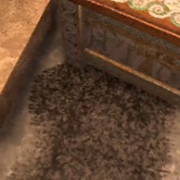|
Sherlock Holmes, Consulting Detective update: We are now playing the Queen's Park Affair, which has some new rules. See the link below to get started on it. Some five years back I started an LP of Sherlock Holmes, Consulting Detective that I never brought to a finish. Now is the time to try and carry on. The game is a mystery-solving game originally published in 1981 by Sleuth Publications. The players (either collectively or competitively) make the choice of which clues to read, and once they think they've gathered enough information to solve the case, they take a quiz. Points are awarded both for getting the answers right and for requiring fewer clues to do so. There are also newspapers, a map of 1890s London and a Directory to use in tracking down who to talk to and where to go. This revival will not continue with any of the original cases, but with the expansion volume The Mansion Murders. This is a set of five new cases, which revolve around the unfortunate (and ever-rotating) tenants of a particular mansion in southwest London. This version makes use of the mansion by having each room in the mansion be a potential clue point, allowing for more intricate use of the murder's location and the chance to interview a more varied cast of characters individually. While I will be doing all five of the cases, a fair warning is in order: One of the cases simply won't work well for this format, so I might rush through it (I figure it's only fair to show it off, though). There's another case that is a bit unusual in another way, which we'll see as well. I should also point out that one case does spoil at least one of the original cases outright. The case that doesn't work well is related to another case from the original game, too. I'll point those out when we get to them. If you're more interested in the original cases, you can always read my original thread, or better yet (especially if you're unspoiled) play along with the video version of the cases being run by Rocket Baby Dolls). None of the Mansion Murders were adapted to video format, so you won't be spoiled by reading either of the threads. Knowledge of those cases is not necessary to solve any of the ones here, either. 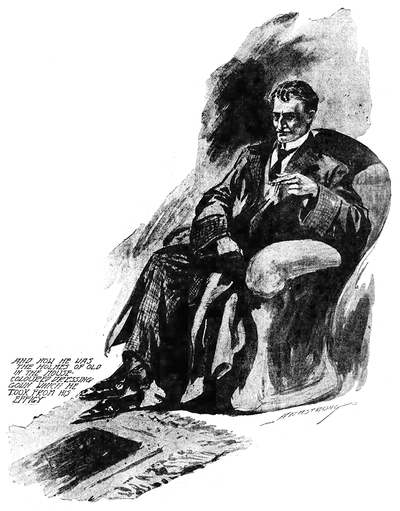 How to Play This will be a collective play-through. All clue point decisions will be by thread vote. Anyone can participate with any decision, but I do hope that thought and careful consideration will be given to the votes. In general, Holmes solves the case in fewer than ten clues (sometimes far fewer), so there will not be that many steps to take. I'll provide a few tips to help out, but will avoid influencing the result. Voting should be done in the thread by providing a ranked list of the top clue points you think we should visit (no more than 5), in order of preference. The final clue will be decided by Borda count (clues get from 5 points down to 1 based on reverse rankings, highest point total wins). Vote rankings will stay in place after visiting a clue point, allowing your votes to remain through multiple clue point visits. You can still adjust which points to visit after reading a clue, of course; I'm just hoping to make the thread move a bit quicker this way. This is a change from how the previous thread handled it, if you were around for it. Once you feel we've visited enough clues, you can also vote to Close the Case (this can be in addition to other votes, e.g. you can vote for a clue point first, and Close Case second, and even more clue points after that). If the vote is to close the case, I'll post the quiz questions and after a certain amount of time, the solution. Quiz answers will not need to be collective and should be posted with spoilers in the thread. Since the game still involves visiting London and the material from the original, the next post will cover how the game works with a bit more detail, and then get started with an introduction from Holmes, and then a tour of the titular Mansion. Or if you want, jump right into the current case. Case List Case 1 : The Termination of a Teetotaler - CASE CLOSED Case 1-A: The Case of Steven Piggott - CASE CLOSED Case 2 : The Tale of the Twisted Trail - CASE CLOSED (WARNING: This case spoils the results of The Case of the Mummy's Curse from the original game.) Case 3 : The Tale of the Defenestrated Debutante - CASE CLOSED (WARNING: This case has some spoilers for The Case of the Lionized Lions from the original game, and also includes a gratuitously racist caricature.) Case 4 : The Retirement of a Retired Colonel - CASE CLOSED Case 5 : The Toxic Trinity - CASE CLOSED Latest Case Queen's Park Affair Day 1 Clue Review Day 2 Clue Review Day 3 Start Kangra fucked around with this message at 22:40 on Nov 30, 2020 |
|
|
|

|
| # ? Apr 19, 2024 01:15 |
|
"We are, as usual, the irregulars, and we must take our own line of action." - The Disappearance of Lady Francis Carfax The Rules The rules of the game are fairly simple. We play as the Baker Street Irregulars, and are trying to solve the case as quickly as Holmes can. For each case, there is an introduction from the Case Book that sets the scene. From there, the first Clue Point to visit is chosen. Once that Clue Point is read, we go on to the next, and so on, until the decision is made to Close the Case. The Mansion (at 100 SW) will also have its own introduction, which is assumed to occur as soon as we visit the mansion. The house rule I used when playing is that if the mansion is visited for this introduction, it was required to also visit a Clue Point inside it, but I'm relaxing it for now. We will get the standard introduction and the mansion introduction for free. Locations that have no Clue Point listed do not count against our score. We can visit as many Clue Points as we like, but visiting too many reduces the final score. Scoring / The Quiz Once we decide to stop looking up clues, the quiz questions are provided for that case. The quiz is a series of questions worth a varying amount of points each, and is divided into two parts. Part 1 is concerned with the important details of the case (as determined by Holmes). The questions here always add up to 100 points. Typically we need to find out who committed the crime and why. Part 2 has bonus questions, which may cover other details in the case, or of other goings-on in London that we may have stumbled into, and can help make up for the score reduction from visiting additional Clue Points. The score from the Quiz is then adjusted based on the number of Clue Points visited. Holmes always sets the standard. The adjustment is determined by subtracting the number of Clue Points the Baker Street Irregulars visited from the number Holmes visited, and multiplying by 5. I don't really care about the score that much, since it's more fun to get through the case and just enjoy the visits to the clue points. So don't try to rush it, just try to find the answers with reasonable efficiency. The Map While much of the action is going to take place in the Mansion itself, we may still find a need to travel to other parts of London. There is a reference map of London used for all locations in the game not at the mansion. The map is divided into regions that correspond with the London postcodes. Within each region the possible locations to visit all have a number. Each Clue Point is in fact indexed in that manner, e.g. 53 EC would be location 53 within EC (East Central). That number is also the street adress, when only the street is given. So if someone says they live at 34 Waterloo Road, you'd need to refer to the map to find that Waterloo Road is in SE, and go to the 34 SE Clue Point. Travel time on the map is not often of importance, but when it is, there is a scale provided (on the original, it was 1" = 5 minutes). This only applies to the characters in the case; it's not needed for players. Also, those who travel by cab or similar conveyance move twice as fast. Due to the nature of the game, an address can take on different meanings in different cases; there's not necessarily anything of importance about this. I interpret it as various actual rooms within a building or city block, or a change of owners, as required. The Mansion in particular is always a bit different. Finally, although the map is generally faithful to real-world London, the game map is the only true reference to use for what streets are called and where buildings are located. In particular, the postcodes do not match up precisely with the real world, for simplicity's sake. (An overview map will be posted with the Introductory Lecture.) Note: The French company Space Cowboys is publishing remakes of the original game, and are even producing some new cases. They actually have a complete case from the original game, downloadable for free from their website. The good part about is that it includes both the map of London (the one posted in pieces below) and the full directory as separate pdf files. You can get it from their website by following the link under 'Free Case'. SW: 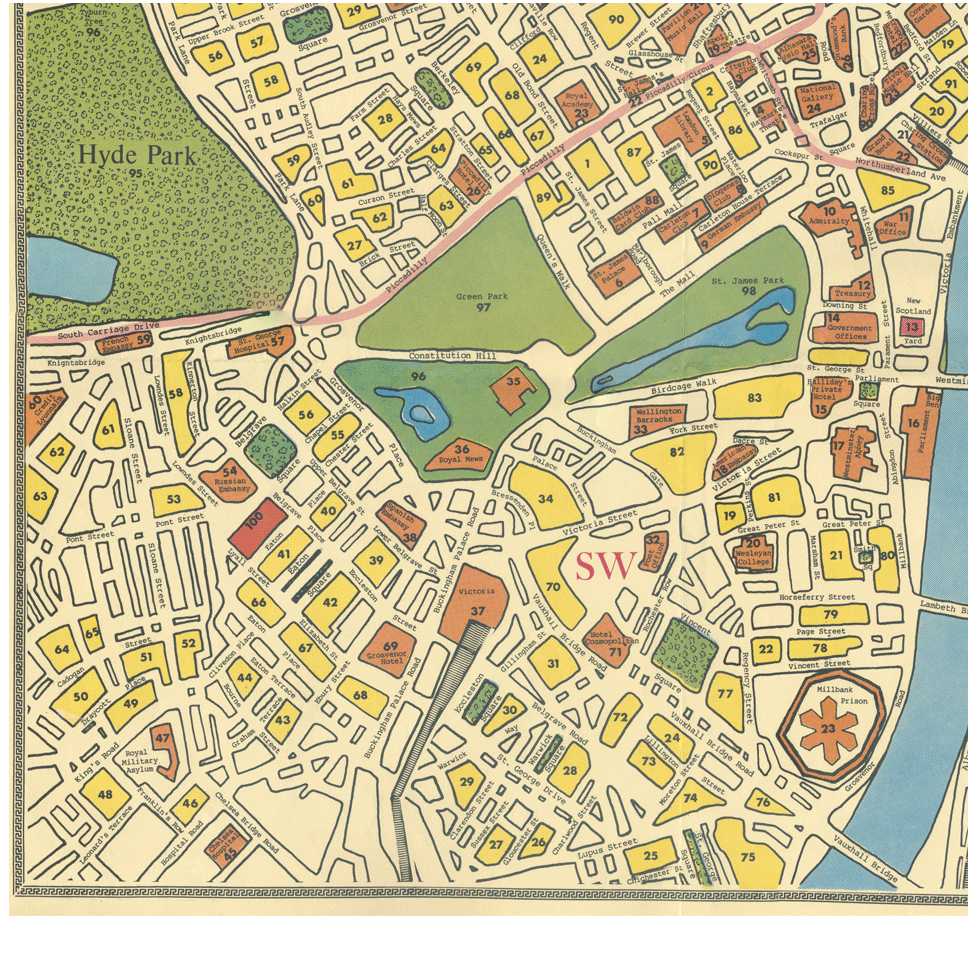 NW: 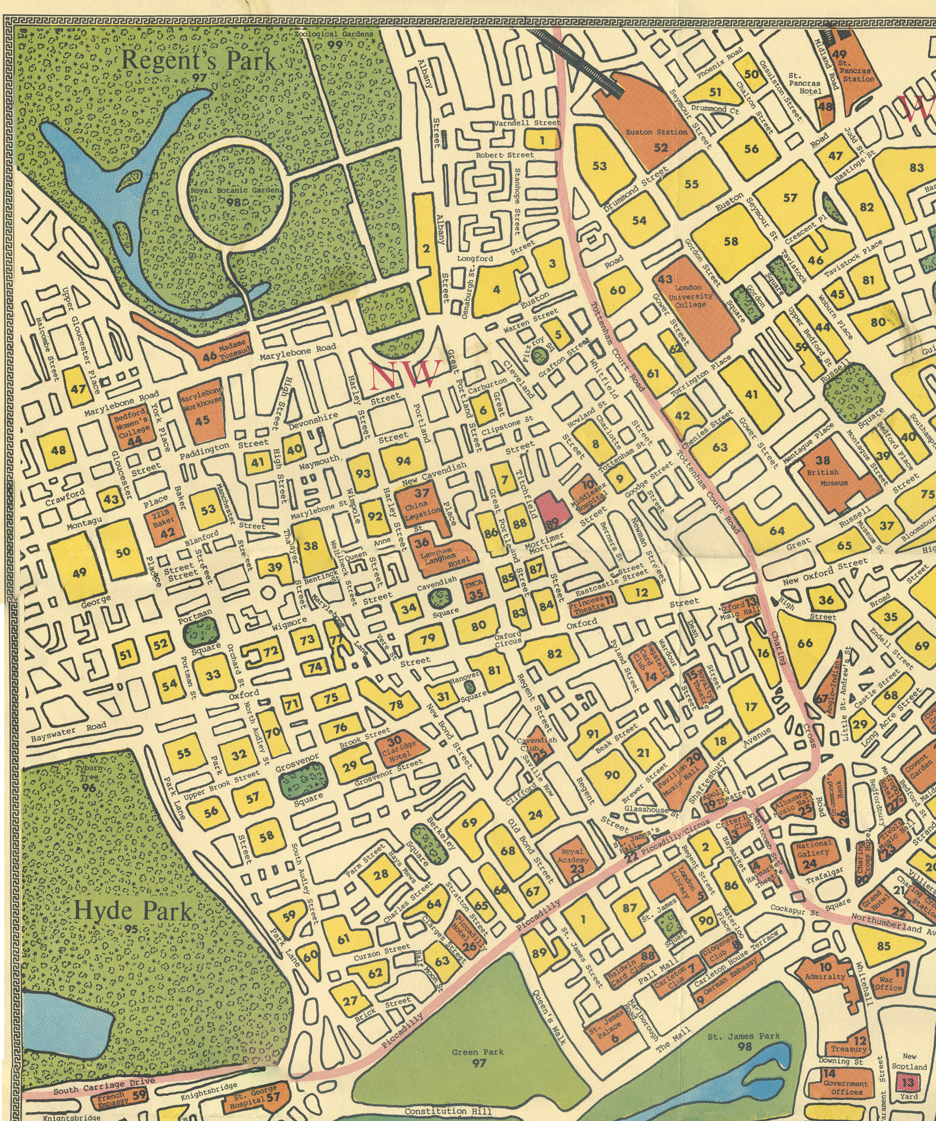 WC: 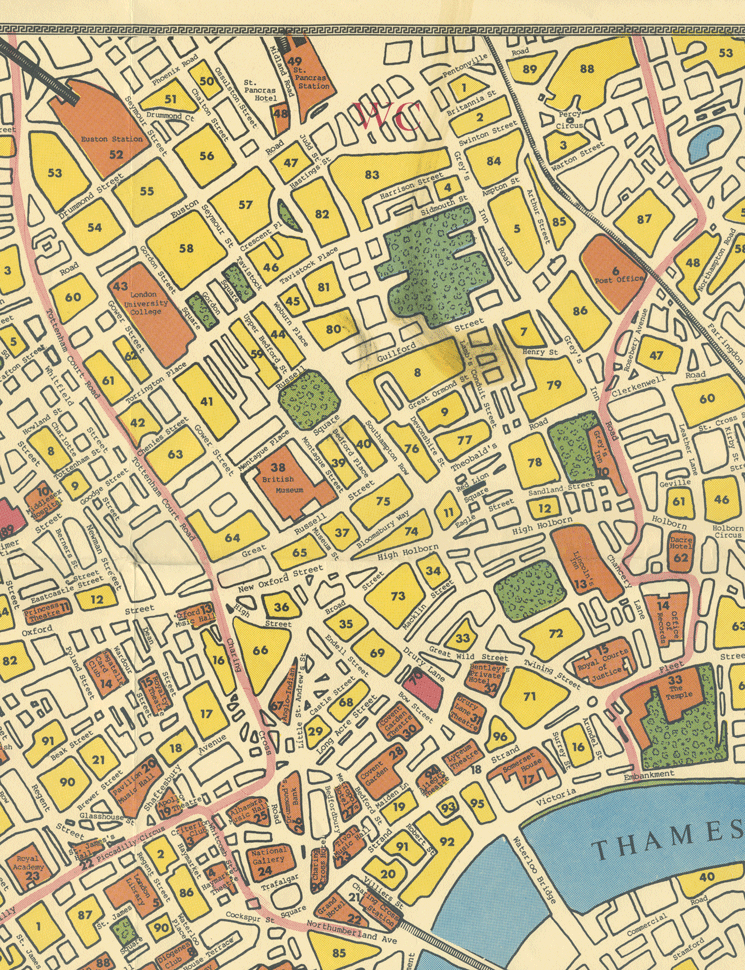 EC: 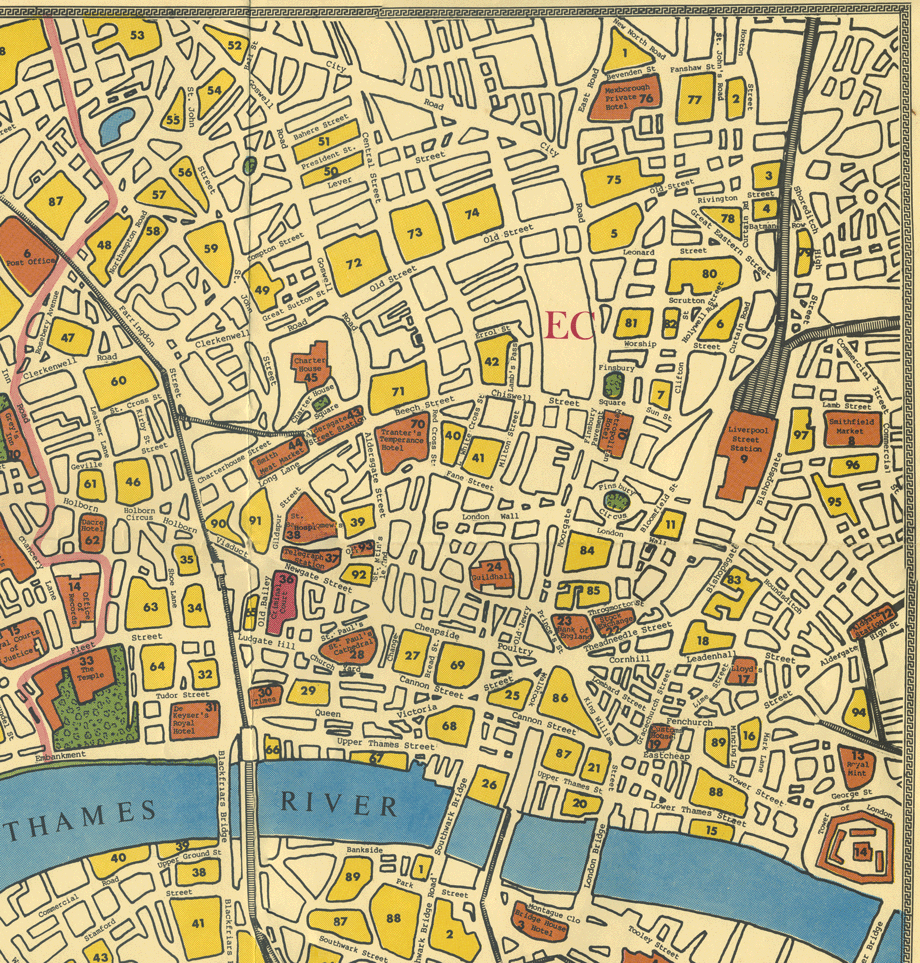 SE: 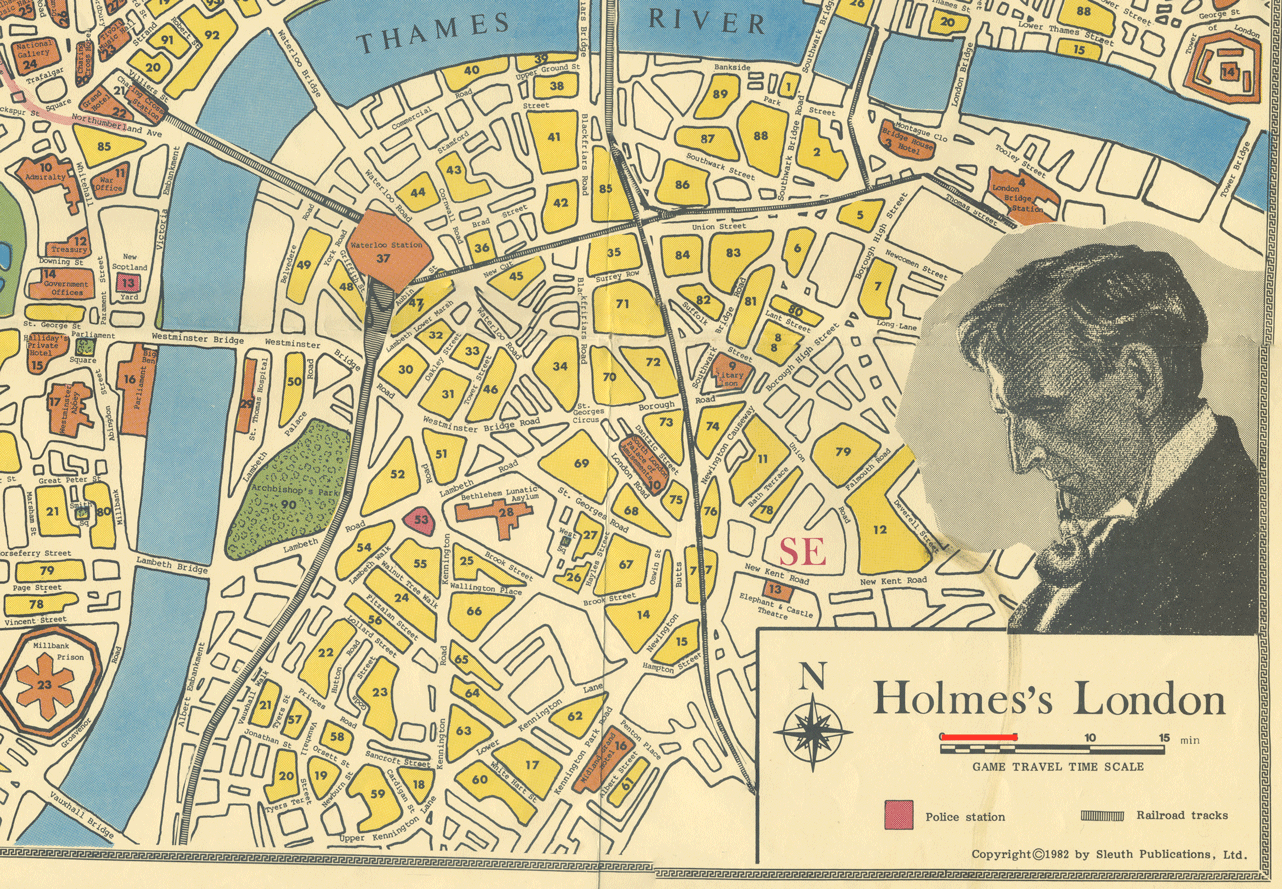 The Newspapers Each case also includes an issue of The Times for the date of that case. Players are able to read the newspaper at the start of each case. They also have access to all papers published prior to that date. The cases proceed in chronological order, but spaced apart so that the results of one case will not be revealed by the newspapers in any later cases (aside from the fact that one of these cases occurs close enough to spoil a case from the original set). I'll be providing scans of the newspapers as required for the cases. As far as I can tell, the newspapers from the original set are not required for the solution, but in some circumstances may add detail, so I'll try to link them in when possible. The London Directory The last major resource at hand is the London Directory. The game provides a lengthy alphabetical index, more or less like a phone book, that gives the address for any person you might think to look for, and for many businesses as well. The Mansion Murders make this slightly easier by giving a short directory of the people occupying the Mansion, which will come with each case. Other directory listings can be searched for by request. To make things a bit easier, I will provide an automatic listing look-up for each person who has a full name given in a Clue Point. I will probably add prominently-featured businesses as well, but don't assume that I am listing all possible Clue Points that can be visited. There are also a fair number of what I'd call 'Category Listings' that group several locations under a bolded heading. Since these are relatively easy to spot when reading through the directory, I'll allow a look-up to get whoever's in the category. The full category listing is below. Category Directory Auction Houses Banks Barristers Baths Boardinghouses Booksellers Booksellers-Used & Rare Carpets Charities Chemists Churches Clubs Cocoa Manufacturers Coroner's Office Cycles Dentists Department Stores Detective Agencies Docks Doctors Embassies Florists Furriers Government Offices Guides Gunsmiths Hospitals Hotels Inns Inns of Court Insurance Companies Jewelers Libraries Map Sellers Music Halls Newspapers Parks Pawnbrokers Police Stations Post Offices Printers Public Houses Restaurants Settlement Houses Shoemakers Solicitors Sporting Societies Stables Stationers Stations Steamship Companies Synagogues Tailors Tea Merchants Tea Rooms Theatres Tobacconists Watchmakers Wine Merchants Tips for Playing Here's a few tips that can help to get a better score. Remember that this is mostly meant to be a fun experience, and some of the cases are quite hard. (Typically you'll get about half of what is needed, and have a good vague idea, but miss some of specifics because you didn't know the right place to find them.) Holmes is not only a genius who always guesses correctly, he has access and knowledge that we might never have. So even if we were to visit the exact same locations as him, we won't necessarily be able to solve it the way he does. Just accept that and realize there are also bonus points to be had. This is actually the game being rather faithful to Arthur Conan Doyle - the mysteries are not always fair. [The cases are overall, but sometimes the key detail is very well hidden.] It's best to treat this the way Holmes himself solves cases (despite everything he says): Build a chain of reasonable inference and see where it leads. If you try to work from merely the evidence as given and build a case only on that, you're not likely to get much. Along with that, don't try to corroborate every detail. If you can make a guess, stick with it. Trying to gather all the evidence leaves you with a low score. It's generally better to test another line of inquiry instead of pursuing one you already have some good ideas about, unless you think more revealing sources are available. That said, don't just abandon something that hasn't yielded any information, unless you're sure it's a dead-end. Remember that some of the red herrings will show up as bonus points. Also, consider that a typical question might be worth 20 points, so visiting three extra clue points to find the answer still puts you ahead. Carefully consider who or where the best source of information will be. If you strongly suspect Person X is the culprit, it's a fair chance they won't want to talk to you (or are already on the run). There aren't going to be any magic clue locations that simply explain the whole case. Kangra fucked around with this message at 06:21 on Sep 25, 2020 |
|
|
|
Holmes' Lecture of 1886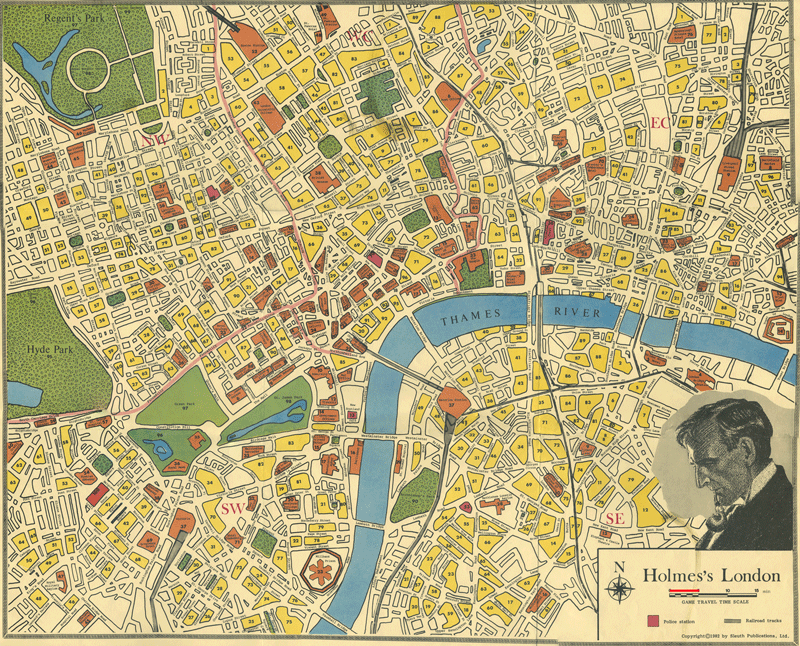 Holmes stood next to a map of London which hung on the wall of the sitting room at 221B Baker Street. Watson intermittently surveyed the scene over the pages of his book, while Holmes paced back and forth in front of a group of attentive youths, his black brier in his right hand, his left in the pocket of his mouse-coloured dressing gown. "London is not a beautiful city. Under the soot that covers its buildings is the residue of the Empire, a teeming mass of four million souls trying to survive, mostly off of each other. Behind this assemblage is a force of evil, a legion of scoundrels weaving their web of iniquity over the city, and in the centre of the web is the master criminal himself, Professor James Moriarty, the greatest schemer of all time, the organizer of every devilry, the controlling brain of the underworld -- a brain which might have made or marred the destiny of nations. That's the man! But so aloof is he from criticism, so admirable in his management and self-effacement that his true character is unknown to the public and police. This fact must be kept in mind in all your investigations." "How has he managed to stay so unknown, Mr. Holmes?" "That is a good question, Wiggins. Moriarty insulates himself from the crimes he controls and the public with an organization of underlings and thugs who make sure that no thread of evidence can be traced to Moriarty. So you can see that we are not dealing with the ordinary criminal mind and we will need all the help we can get. "Today we will discuss some of the people who will be of help to you in your investigations. At the start of any investigation you must keep in mind that it is a capital mistake to theorize before one has data. Insensibly one begins to twist facts to suit theories, instead of theories to suit facts. The people that I will introduce you to at this time will help you collect the facts." I'm summarizing the rest of the lecture: Holmes describes the following locations, any of which may be a Clue Point in the course of any case. Images below with a yellowish-brown background are what the game itself gives for that person. 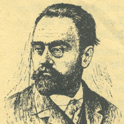 38 EC - St. Bartholomew's Hospital Sir Jasper Meeks, the Coroner's Chief Medical Examiner. Holmes calls him "London's greatest forensic pathologist". The details about the literal corpus delicti may be obtained here, assuming it's a body that would make it to him. All murder victims under police investigation will be examined by Meeks. 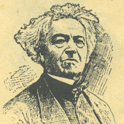 22 Regency-street (SW) - Scotland Yard Criminology Laboratory The contact here is H.R. Murray, Head Chemist. He is the man to go to for the examination and interpretation of physical evidence taken from the crime scene. 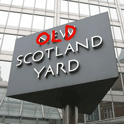 13 SW - Scotland Yard The headquarters of the professional police. Holmes refers to Gregson and Lestrade as the "pick of a bad lot". 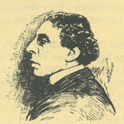 14 Chancery-Lane (WC) - The Office of Records The building houses legal records, both criminal and civil, as well as state-papers. Contact is Disraeli O'Brian, Head Clerk of the Land Records Department.  17 WC - Somerset House Office of the Registrar-General of Births, Deaths, and Marriages Probate Registry Commons Will Office All records are open to the public - no contact necessary. 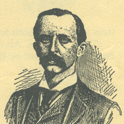 36 EC - Old Bailey The Criminal Court. Our contact is Edward Hall, a young barrister who can be found there most days. Of him Holmes says, "a cut above the other unimaginative members of his profession". "Mr. Holmes!" "Yes, Simpson?" "Could you tell me the difference between a barrister and a solicitor?" "Yes, of course. A solicitor handles the routine legal business of our society. If you do not have to go before a court, then you will have no need for a barrister. If you must go before a court, then your solicitor would engage a barrister. A barrister is a member of the highest class of lawyers who have the exclusive right to plead in superior courts. The particular business of the barrister is the advocacy of causes in open court and except in criminal cases, he may not undertake a case without the intervention of a solicitor who actually prepares the case for trial." The game was made for Americans, in case it's not obvious. Although they sometimes opted for British spellings (which I've preserved) to be more faithful to the original, I suppose. 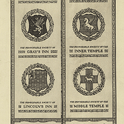 10 WC Grey's Inn 13 WC Lincoln's Inn 33 EC The Temple The Inns of Court are legal societies. All barristers must belong to one of the four (the Temple is split into the Inner Temple and the Middle Temple), so these are potentially worth a visit when dealing with matters of the law. 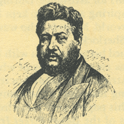 52 EC The Raven and Rat Inn Shinwell Johnson, also known as Porky, did two terms at Parkhurst but is now trying to start a new life as the proprietor of a tavern. He still his a lot of contacts in the underworld, and many of his patrons have criminal connections as well.  18 Shaftesbury Avenue (NW) Parson & Sons Toy Shoppe 'Fred Porlock' is a pseudonym of a member of Moriarty's organization who has chosen to inform on his master. He leaves coded messages at the toy shop (often making use of the toys) that give a clue as to what Moriarty is up to lately.  30 EC The Times It's always good to have contacts in the press. Henry Ellis is the foreign news editor. He's the best source for what's going on in Europe, but he also takes an occasional interest in crime news. 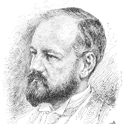 35 EC - The Police Gazette Quentin Hogg (former police inspector turned crime reporter) is our contact at the Police Gazette. 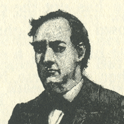 8 SW - The Diogenes Club Sherlock's brother Mycroft is an invaluable (albeit invisible) figure in the British government. He lodges in Pall Mall and spends his days in Whitehall, but can often be found at the Diogenes Club if we need him.  2 SW - The Societies Club Langdale Pike can be located here to obtain the latest gossip on social scandal. 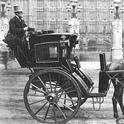 5 Grey's Inn-road (WC) - Central Carriage Stables All of London's cabs are stabled and dispatched from here. 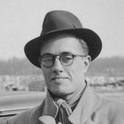 5 SW - The London Library If we're searching for additional information on a subject, we can go to the library, where Watson's friend Lomax can help us out. One other note on names: The creators love to make references with their character names. The resemblance of any character to a fictional or real person (that would not be known to Holmes) should be assumed as purely coincidental, and of no relevance to the cases.
|
|
|
|
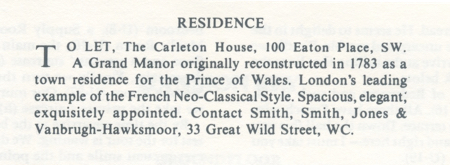 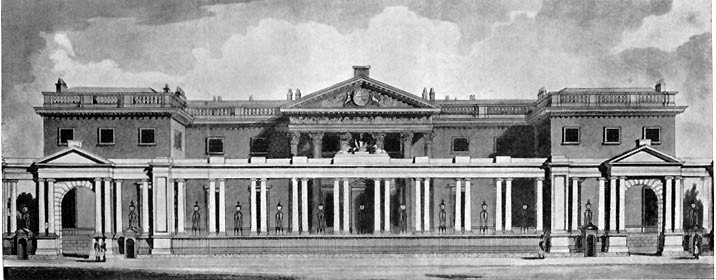 MANSION TOUR Under the Portico of Ionic columns mounted on podiums, waits Mr. Renford T. Pennypacker of Smith, Smith, Jones & Vanbrugh-Hawksmoor. He is a small, energetic man whose broad and somewhat artificial smile, topped by a thin moustache waxed to two needle points, dominates an otherwise featureless face. He proffers a dainty hand which once accepted is drawn back to his stomach to intertwine with its partner, much in the manner of a diva about to render an aria. With a voice that pipes, twitters and sometimes squeaks, he sets about a guided tour of the mansion. As we are outside, he points out the spaciousness of the Principal Court and notes that it is more than adequate to receive an almost limitless number of carriages, “enough to satisfy the most inveterate party-giver.” He also mentions the large Coach Yard around to the southwest. The Porter’s Lodge (G-50, G-51) and Blacksmith Shop (G-52) stand like a miniature Greek temple off to the right. To the left, abutting the main building, is the Upper Kitchen (G-40), Cook’s Chambers (G-41, G-43) and a staircase (z) leading to the downstairs level. “Deliveries of foodstuffs and such can be discreetly unloaded and whisked downstairs to their proper place, all without hindering the flow of more seemly traffic.” As a last note before we enter the building, Mr. Pennypacker points out the Front Balcony above and the two staircases (a & b) from which to gain access to it from the ground. “Of course, one can stroll onto the Balcony from the bedrooms upstairs via French windows, but you will see for yourselves in good time. Now, if you will follow me?” He leads us up the front stairs and into the First Hall (G-1) and turns left into an Antechamber where he points out a staircase (k). “A servants’ staircase, it leads downstairs and also upstairs. By closing this door beside the fireplace here, servants can be about their business, either up or down, in the most unobtrusive manner. You will notice, tucked away around this corner another staircase (o) leading to the kitchen below. It is used to service the Main Dining Room. To be used in lieu of or as an adjunct to the aforementioned stairs, is the dumb waiter (w). It is relatively small, 24”x24”x18”, yet it quite adequately connects the kitchen with this floor as well as continuing to the Drawing Room (U-1) upstairs.” He swings open two large doors and enters the Main Dining Room (G-27). His enthusiasm for the “stout, English oak” out of which the table, some thirty feet long, has been fashioned, the draperies of the “finest velour” over the tall windows which look out upon a “pleasant green sward” and the chandelier of “Venetian crystal” seems boundless. His monologue at long last over, he turns on his heel and advances into the adjacent room, the Library (G-26). “This room is my personal favourite,” he says, beginning to rhapsodize once again. The Library, a cylindrical room, extends through the upper floor to a glass-domed cupola. An open gallery rings the room and a wrought-iron circular staircase (m) runs up to the gallery and down to the Sports Room (D-5), thus connecting all the floors of the mansion. “There are close to twenty thousand books here, all leather-bound of course, on every subject imaginable. They are included in the rental price.” With that Mr. Pennypacker sweeps into the Great Drawing Room (G-25). “Here we have a room fit for large gatherings. Clear the furniture away and you have a ballroom. Arrange chairs in rows, insert a raised platform and you have a performance hall. Very versatile. Notice, if you will, the top half of the casement windows — Belgian stained glass. Exquisite!” In the adjacent room (G-22), Mr. Pennypacker points out the French windows which open out onto the Veranda (G-35) and the garden beyond. “This room and the two in this direction can be adapted to almost any use. This could be a study or perhaps a billiard room. The near room (G-23) could be a Gentleman’s Smoking Room and the farther one (G-24) could serve as a Small Drawing Room.” He turns and leads the way through the State Room (G-21), a luxuriously appointed conference-reception room and an Antechamber (G-20) and into the rooms beyond. “The rooms clustered in this corner form a very nice private suite. The Antechamber (G-17) and the Salon (G-15) here are the only other rooms that have French windows and thus access to the Veranda. This Stairwell (G-16) contains a private staircase (h) to both the upstairs and downstairs. There is a Dressing Room (G-13) beyond the Bed Chamber (G-14)and a... er... Water Closet (G-12) also.” Blushing, Mr. Pennypacker hurries off through the Bed Chamber, the suite’s Antechamber (G-11) and into a hallway. He pauses to point out another servants’ staircase (g) that once again spans the three floors of the mansion amidst the corridor of servants’ rooms (G-10, G-9, G-8, G-7, G-6, G-5). “Here at the other side of the mansion we have the Master Study (G-3), its Closet (G-4) and adjoining Antechamber (G-2) as well as its Private Staircase (c) that leads to the Master Bedroom complex above (U-5, U-6, U-7).” Mr. Pennypacker has succeeded in leading us in a full circle around the outer perimeter of the mansion so that we arrive back in the First Hall (G-1). “Now if you are not too tired we will go upstairs.” Without waiting for our reply, he starts down the two stairs into the Main Hall (G-30). “Oh, next to the Porter’s Room (G-31) is another servants’ staircase (e) to the downstairs and beyond that, a staircase (d) from this floor to a Turkish Bath (U-26) above ... Ah, the Tribune (G-34) and the Grand Staircase (j)!” In the centre of the Tribune, Mr. Pennypacker suddenly spins about with his arms outstretched. Just as suddenly he is embarrassed by his emotional display and freezes in mid-spin. “Uh ... uhumm ... the marble used in this floor here and for the Grand Staircase is Florentine white, very rare and very pure. Notice the distinct sound the leather soles make when they come in contact with it.” He gently taps his foot to illustrate. Looking up toward the ceiling— the Tribune, like the Library, pierces the floor above— he points to the chandelier hanging there. ‘“This chandelier is, of course, the twin of the one in the Main Dining Room.” Before we start upstairs via the Grand Staircase, Mr. Pennypacker points out a hidden alcove which contains the Card Room (G-18), an Office (G-19) and another servants’ staircase (i) which leads to the downstairs. “Oh, yes. Somewhere in the mansion is a secret room once used for... Well, never mind what it was used for.” Our trip upstairs is agonizingly slow due to Mr. Pennypacker’s almost reverential tread. He seems to delight in the sound his shoes make on the uncarpeted marble. Finally we curve around and up and arrive at the railing that lines the gallery to take one last look below. “Behind me are a series of Bedrooms and such (U-11, U-12, U-18, U-14, U-15, U-16). All these have French windows and open out onto the terrace. Down the hall this way is the Upstairs Study (U-17) and right here— I must take you in— is the Tapestry Room (U-19). “The Tapestry you see, almost covering the three walls of this room, is fifty-two feet in length and twelve feet in height. It dates from the thirteenth century. As you can see, it depicts scenes from the life of Christ, and was executed by Lady Anne of Coventry, single-handedly. Her brother had been deeply wounded in a joust involving her honour and as a pledge against his recovery she took an oath to devote her life to God’s service. The Tapestry was her expression of that devotion. The story has it that as she completed the final weave— it took her fifteen years to complete it— she dropped dead. After a moment of silence, we exit the room and proceed toward the front of the mansion. “More Bedrooms (U-20, U-22) and an upstairs Smoking Room (U-21) where that discreet servants’ staircase (k) I mentioned when we were below enters the upper floor. Over here is another large Drawing Room (U-1), the last stop for the dumb waiter (w) and along the front, more Bedrooms (U-2, U-3, U-4). These three and the Antechamber to the Master Bedroom (U-5) all have French windows which. open out to the Front Balcony.” We pass by the Master Bedroom Suite (U-5, U-6, U-7) and turn the corner. “Ah, the Turkish Bath (U-26)... Decorated in a mosaic tile pattern which is an exact copy of the Sultan of Ismire’s own private bath. Ours is much smaller, of course.” Continuing around, Mr. Pennypacker points out another Bedroom (U-8), a Supply Room (U-9) and the Upstairs Maid’s Room (U-10), the main staircase (f) to the ground floor and a servants’ staircase (g) which goes all the way downstairs. Finally we turn the corner again and enter a Storage Room (U-27). Our tour of the upstairs completed, we take the private staircase (h). By the time we arrive at the bottom, it is evident that his zest for the tour is waning. We detect a severe cracking in his ever-present smile and the pointers of his moustache have begun to droop. We turn the corner into the Furnace Room (D-15) to discover that the boiler sits in an open air shaft. The staircase (p) beside it ascends all the way to the roof. We pass by the Coal Chute (U-16) and the Cellar Doors (n). Mr. Pennypacker is about to turn to the left but suddenly stops. When in airy wave of his hand he comments, “Well, down there are the usual servants’ quarters, a wine cellar, cheese room, seed room, etc. Oh, an Armoury (D-10) with some unusual suits of armour and other medieval artifacts but we can save that for another day.” He leads us through the Underground Passage (U-23) and up a staircase (y). Quite suddenly we find ourselves in the Porter’s Lodge (G-50) and out into the Principal Court. The tour completed, Mr. Pennypacker immediately turns the conversation from one of art and architecture to one of pounds and pence. He quotes the price for the rental of the mansion. ‘“And that includes regular maintenance... It really is a bargain, don’t you know. .. Of course, there is no need to make a decision at this moment... Certainly think about it...” A carriage enters the Principal Court and Mr. Pennypacker suddenly brightens. He resurrects his all but faded smile, twirls the droop out of his moustache and murmurs breathlessly, “Lord Wiggleston!”’ He starts to move towards Lord Wiggleston when, as an afterthought, he waves his business card in our direction and mutters a dismissal. Carlton House (note the spelling) was a real mansion, with the history described above (the image is of the original house). In real life it was located between Pall Mall and St. James Park, at a place now known as Carlton House Terrace. In fact, that location exists on the game map at 7-9 SW. You can also examine the floorplan below and see that it is based almost exactly on the actual building, which was demolished in 1826. Numeric references in the tour refer to the Upstairs, Downstairs, and Ground level circled numbers on the maps below. Staircases are marked by lower-case letters on each floor they extend to. You're also treated to with the annotations I made as a kid, which should be mostly accurate (if less than legible). If people would like a higher-resolution map I can break up the plan and post larger images. Ground Floor: 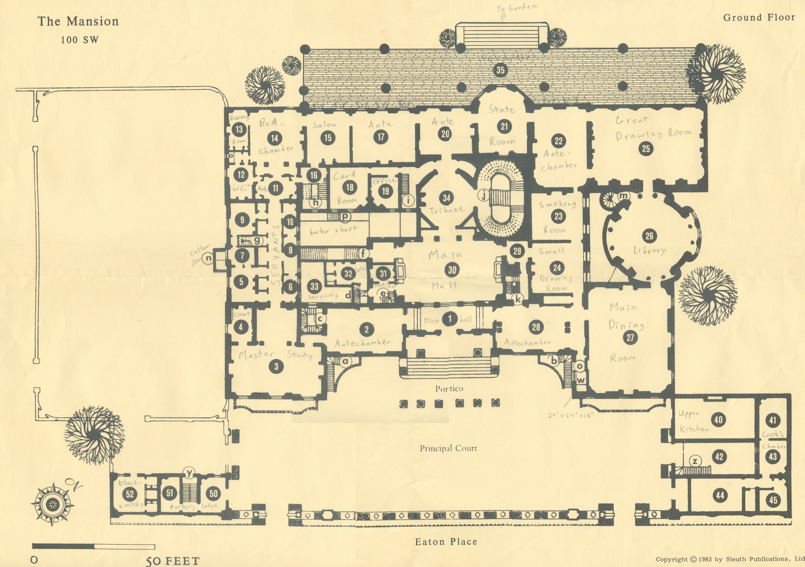 Upstairs: 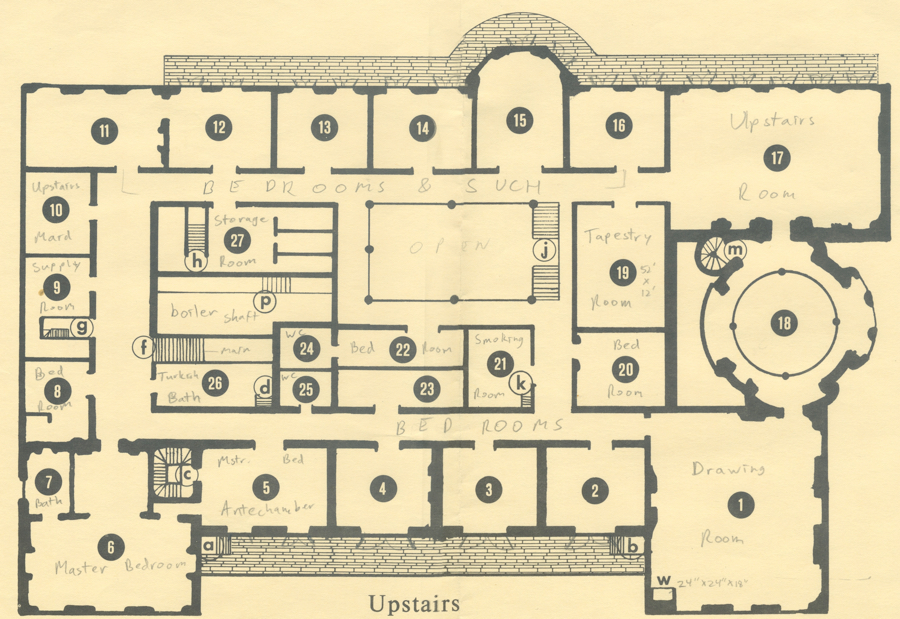 Downstairs: 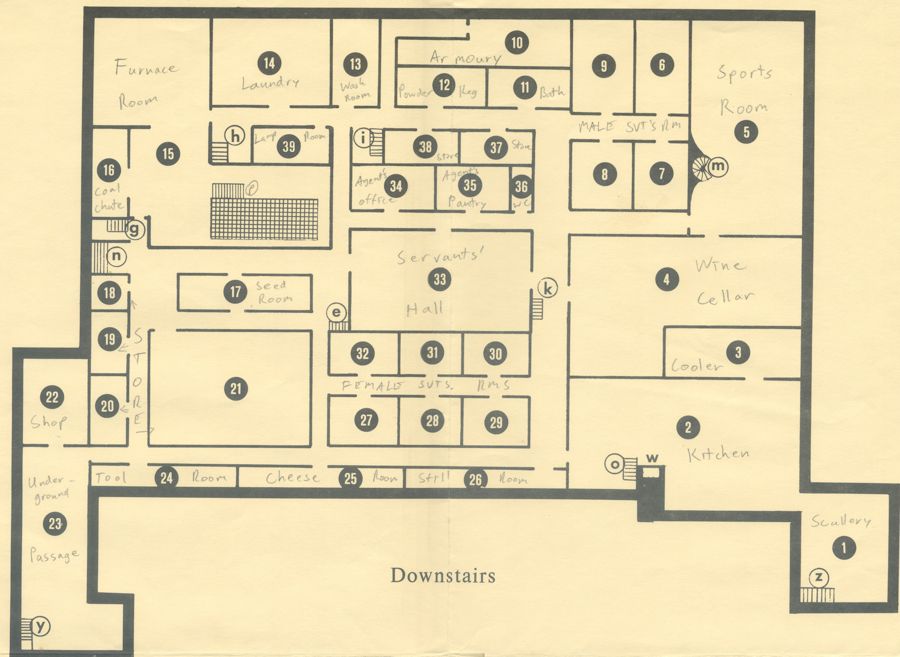 Note that any of the tenants may re-purpose the rooms to their own purpose. As mentioned, there will be an index of which rooms e: The listing that comes with each case only indicates specifically reconfigured rooms; the other rooms have their default configuration but may also have a clue point. Recall there is no penalty for visiting places with no clue point. The actual first case should be ready to start in a day or two. Kangra fucked around with this message at 17:30 on Apr 23, 2020 |
|
|
|
I'm extremely pleased to see that you've started this! I'll read through after I finish work and I will make a decision then. Edit: I missed the part about the case not starting yet. Rocket Baby Dolls fucked around with this message at 21:54 on Apr 22, 2020 |
|
|
|
CASE 1 The Termination of a Teetotaler Saturday, 8 September, 1888 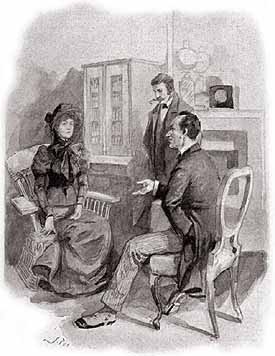 Please, Doctor Watson, please, you must get Mr. Holmes to help Donald, please, you must!” The young woman drops her head into her gloved hands and bursts into tears. Watson puts his arm around her shoulders and tries to comfort her. At the same time he looks towards Holmes, his eyes pleading for help. Holmes is standing at the fireplace filling his pipe from the well-worn Persian slipper that serves as his tobacco pouch. He is making no effort to hide his look of discomfort and annoyance and gives no indication that he will help Watson comfort their sobbing visitor. “Ah, don’t despair Watson, help has arrived.” Holmes moves towards us as we stand in the open doorway. “Come in, Wiggins, come in all of you. Everyone take a seat. As you can see, Watson is in need of some help.” Watson leaves his charge to her solitary sobbing and joins us. Holmes is putting on his inverness coat and felt hat and moving with determined speed toward the door. “Holmes, you can’t leave now!” “I can and must. I have an important appointment that will not keep.” “But Holmes, it’s a woman in trouble.” “Come, Watson. I have always looked to you as the expert on the fairer sex. I am sure our friends can help you clear up this matter. It should be of some interest. Good day.” Holmes punctuates this last statement with a slam of the door. Watson sighs and turns his attention to us. His expression makes it clear that we are not viewed as adequate substitutes for Holmes. Another sigh escapes from Watson as he looks over to the young woman who is the cause of his perplexity. “Mrs. Sipton? Do you feel up to talking to my friends? They may be able to help us with your problem.” “If I could...just have a...” At this moment the door opens and Mrs. Hudson moves her stout but motherly frame into the room. “Excuse me, Doctor Watson. Mr. Holmes asked me to look in on you. Said you might need my help.” “Yes? Yes! Yes, indeed. If you could take Mrs. Sipton and help her, uh, freshen up?”’ “Mrs. Sipton? The Mrs. Sipton?”’ “Yes,” answers Watson. “Oh, the poor dear.” Mrs. Hudson moves from the door towards Mrs. Sipton who rises to meet her. “Come along, dear. A little cool water on those swollen eyes will help you feel better. Come along, dearie.” With a comforting hug she guides the young Mrs. Sipton out through the door, closing it gently behind them. As the door closes, Watson collapses into an empty chair across from us. “At times Holmes's lack of sensitivity can be rather trying,” sighs Watson. “I am sure he must have his reasons. “Well, let me fill you in. Around nine-thirty last night Sir Alfred Sipton, the tea tycoon, was stabbed to death in his study at the Sipton mansion. Most of the family and staff claimed to have been out or in their quarters at the time of the murder and shed no light on this foul deed. Cecilia, Mrs. Sipton, says she was at the opera at the time of the murder. For some yet unexplained reason, there were two men from Scotland Yard at the mansion at the time of the murder. They were the ones who heard Sir Alfred cry out for help. When they broke through the study door they found a man, Donald Stillwater, bent over Sir Alfred’s body, his hand on the knife that was embedded in Sir Alfred’s heart.” “Then the murderer has been apprehended,” states Wiggins. “The police have charged Stillwater with the murder of Sir Alfred and are holding him at Old Bailey,"” replies Watson. “Then what is it that Mrs. Sipton wants of Holmes?" As if Wiggins’s last question were her cue, a refreshed Mrs. Sipton re-enters the room. All the men around the table stand as she settles into the chair next to Watson. She is a beautiful woman whose age cannot be more than twenty-five. Her long auburn hair frames a face whose natural beauty needs no artificial aids to make it breathtaking. Her long delicate fingers still hold the lace handkerchief that had been the reservoir for her tears, but now her clear blue eyes look at us without a trace of dampness. “I have just been explaining to our friends and associates the tragic events that have befallen you. Mr. Wiggins has just asked what you wanted from Holmes. I think you should answer that question.” “Yes, I would be happy to,” says Mrs. Sipton in a strong clear voice. “‘I must apologize for the way I carried on. It—" “Not at all, my dear. It is understandable.” Watson gets nods of agreement from the rest of us around the table. “Thank you. You have been most understanding, Doctor Watson.” Mrs. Sipton turns her attention to us, “‘Last night I lost my beloved husband and my best friend has been accused of his murder. I just can’t believe that Donald had anything to do with Alfred’s murder. We have been friends since childhood. Donald is one of the most God-fearing and gentle of men; murder is just not part of his nature.” “Did your husband and Donald know each other?” “Yes, Donald and I met Alfred at the same time, six years ago. At that time, we were both members of the Salvation Army. Alfred was donating money to open up some new penny sit-ups.* Donald and I helped him on that project, and today Donald is in charge of one of them as well as a soup kitchen. He’ll soon be a Major. He...oh, you can see he is not the type of man who could commit a murder.”’ “I assume Donald denies that he is the murderer?” “Of course!” “So you have talked to him?” “No. No I haven’t...but...,” at this point her clear eyes again begin to fill with tears. “Please, my dear,” says Watson. “If we are to help, you must answer our questions.”’ “I'm sorry. I'm alright now. What is it that you want to know?”’ “What reason do the police have to think that Donald would want to murder your husband?”’ “My husband was much older than I, old enough to be my father. In his way he was a kind man; he was always good to me and his family. He was lonely and needed someone to help with his charitable works. At first, right after our marriage, Alfred was very nice to Donald. Then, for some unknown reason he became jealous of Donald.” “Jealous?” Wiggins cannot stop his eyebrows from rising. “It’s not what you think. Donald is like a brother to me. We grew up together in the same house. Donald’s mother died when we were young and my mother took him in and raised him like a son. Alfred never accepted my feelings for Donald. It became an obsession with him. He forbade me to see him under any circumstances. I devoted all of my time to charitable work and household tasks. “About three years ago Alfred’s health began to deteriorate. He developed a heart condition which grew progressively worse. Dr. Agar, Alfred’s doctor, told him he must take the stress out of his life or die. Alfred retired from the daily running of the business and spent his time at home. My time was taken up caring for him.” “So there was enmity between your husband and Donald?” “No! That's why none of this makes any sense. About eight months ago Alfred apologized to me for the way he had treated Donald and myself. He invited Donald to the house and apologized to him also. Donald was even helping him with his plans for a new hostel in the East End. They were on their way to becoming friends.” “Do you have any idea who would want to murder your husband?”’ “No. None at all. I just know it wasn’t Donald. Please, can you help me?” “We’ll try,” Watson and Wiggins respond in unison. Footnote from the casebook: * The penny sit-ups were Salvation Army hostels where, for a penny, destitute people could spend the night in a shelter. They were not allowed to lie down, but had to spend the night sitting on hard wooden pews. Newspaper for September 8, 1888 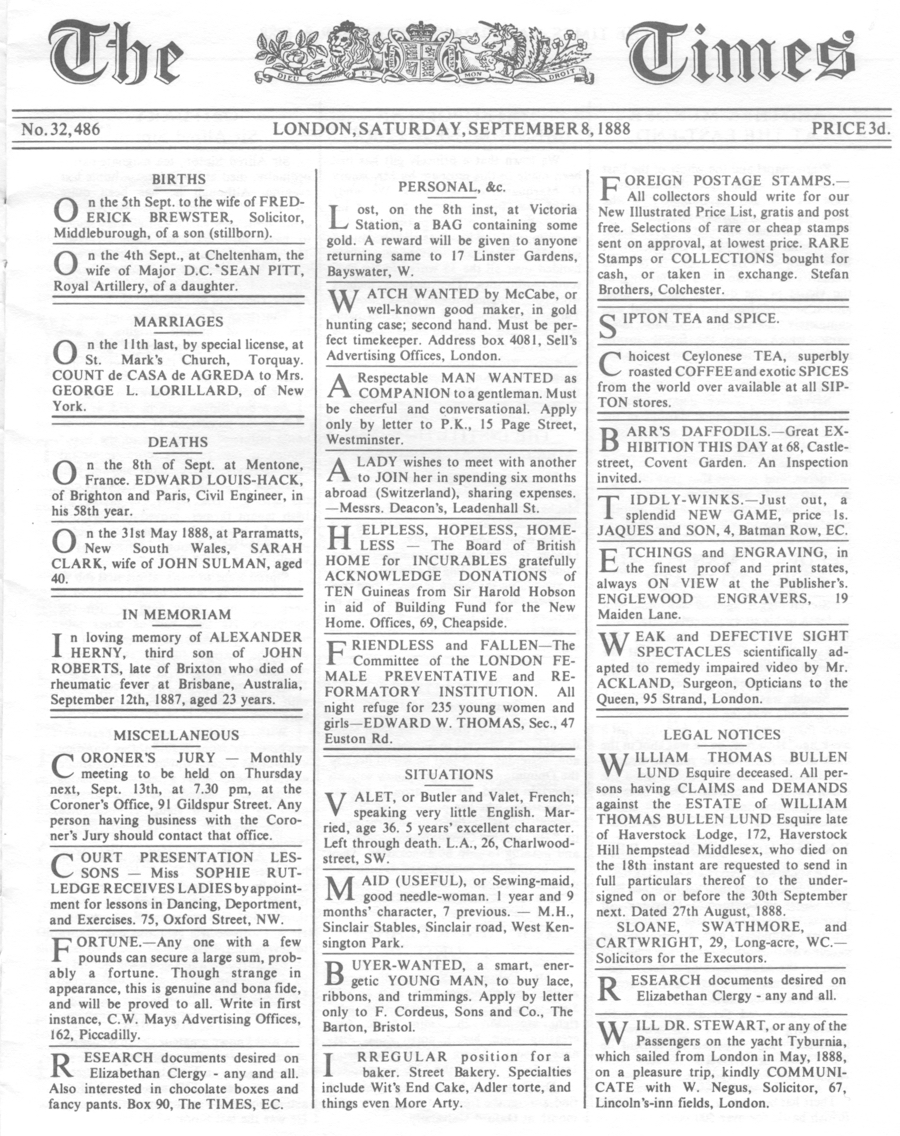 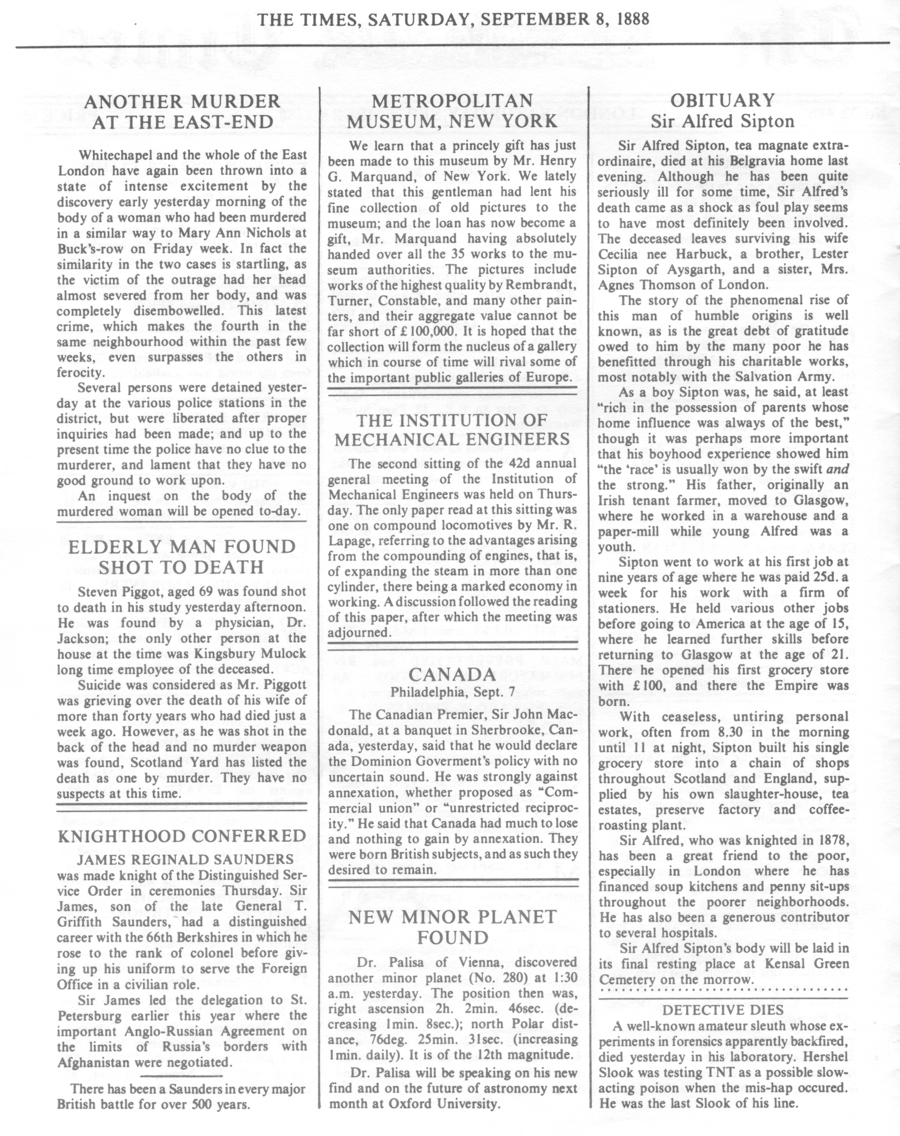 While I'm fairly sure that these cases do not rely on the earlier newspapers, I'm giving links to them just in case there is some extra detail that is helpful. The game is a bit vague on this point. It generally assumes that players would not play this without having played the original set. However, no clue is ever mentioned as coming from the newspapers that are not part of this set of cases, so reading them is considered optional. These are the papers, from my previous thread: March 1888 (scroll down) July 1888, August 1888 Directory look-ups for named people: (Sipton) Singer, Marilyn........54SE Sipton, Sir Alfred.....100SW Sipton Tea Co..........39EC Sir Galahad's Pub......27EC e: Originally I had a typo indicating Sipton's house was at 10SW; the mansion is indeed 100SW, and he did not have another residence. (Stillwater) Stewart, Mrs...........38SE Stimson & Company......17SE (Agar) Adrian, Adrian.........41E Agar, Dr. Moore........43NW Aguirre, Carmen........41SW (Salvation Army) Saltzmann, Murray......40E Salvation Army.........69EC Salvation Army Hostel..42SE Salvi, Valentine.......52E Feel free to start speculating on who/where to visit, but bear in mind we will still be visiting the mansion before voting officially starts. (Yes, there's a lot of set-up to these cases). Kangra fucked around with this message at 19:25 on Apr 28, 2020 |
|
|
|
SIPTON MANSION Bruce Nigel, butler and head of the Sipton house staff, greets us in the hall of the stately mansion. He is in his mid-forties, tall and thin with light brown hair. Like many servants of the wealthy classes, he affects a condescending bourgeois manner. “Mrs. Sipton has requested that I advise you concerning the members of the household and place myself at your service.” “Thank you.” “Would you like me to give you a description of the staff?” “Please.” “I will start with myself. Bruce Nigel, age forty-five, in charge of the Sipton house staff for the past fifteen years. Before that I was Sir Alfred’s personal valet. At that time it was a bachelor household which consisted of Sir Alfred, Margaret Brissman, who was then as she is now, the cook, and myself. Fifteen years ago Sr. Alfred was joined by his sister, Mr. Agnes Thomson, after her husband’s death. Mr. Thomson had lost all of his money and had killed himself. Mrs. Thomson was obviously very distraught, and she became quite dependent upon her brother. “We moved to larger quarters in Bloomsbury to accommodate our expanded household, which then included Mrs. Thomson, her son Roger, her maid Elaine Mondino and a young lad, Rodney Harrington. For the next ten years the household remained constant as Sir Alfred’s business grew.” As he has been talking, Nigel has led us into the north antechamber where we are now sitting. “Six years ago, when Sir Alfred married Mrs. Sipton, we moved into this mansion. Young Mr. Thomson, who had married the year before, was invited to bring his wife and infant son and come live at the mansion as well. About three years ago Mr. Hofstadter, Sir Alfred’s personal secretary, moved in. At that time Sir Alfred was recovering from a stroke, and was doing most of his work at home. Mr. Thomson, who had been working at Sipton Tea since graduating from Cambridge, moved up to the head office. “That pretty much covers the members of the household. Oh, I forgot little Roger: he was born in the mansion four years ago. Any questions?”’ “Are there any conflicts within the family?” We can tell by the pained expression on Bruce Nigel's face that he finds this question of dubious taste. "Mr. ..." “Wiggins.” “Mr. Wiggins, I have been requested by my late employer’s wife to talk to you and to answer your questions. I am doing so in the hope that you will find the truth in the matter of my employer’s death. Sir Alfred was more than an employer to me, he was a man I admired and respected. My twenty years with him have given me the opportunity to gather a great many insights into his family. I did not violate his trust while he was alive, and I have no intention of doing so now that he is dead.” “Yes, of course. What can you tell us of the staff?” “The Lewis sisters were hired when we moved into the mansion. They are good workers for the most part, but are not very serious young ladies. They spend most of their free nights in the music halls with young men whose intentions are quite obvious, far from honourable, and most likely successful. “The Stropes came with the mansion. Mr. Strope was the gardener for the previous owner, and Sir Alfred kept him and his wife on. Good common stock, good workers both. They are in the south now, Dorset, and are not expected back until the end of next week. “Miss Dell-Olio, the Thomson’s governess, works directly for them, and as such is not answerable to me. She has been with us for six years and seems to be remarkable woman, intelligent, hard-working and of the highest moral character. “I believe that covers everyone. Oh, Cynthia, the scullery maid. She has only been with us a month or so. We often take in girls from the Salvation Army for short periods, and she is one. She is a little slow, not too bright.” “You mentioned a Margaret Brissman?”’ asks Wiggins as he looks at his notebook. “Yes, the cook. She is a dear woman and was very devoted to Sir Alfred.” “And Rodney...” “Rodney Harrington, who is now the coachman, has been with us since he was a boy of fifteen. He was in some ways like the son Sir Alfred never had. Sir Alfred has done a lot for him and was very fond of him.” “Could you tell us where we could find these people?” “Yes. Margaret is in the kitchen (D-2). Rodney is in the blacksmith shop (G-52). I am sure you will find Wanda and Dotty in their room (D-27). Miss Dell-Olio should be in the children’s nursery (G-17). No telling where Cynthia is, Margaret should know. “Mrs. Agnes Thomson should be in her room (U-1), but I think the doctor asked that she not be disturbed. She has taken her brother’s death very hard. Roger and Prudence Thomson can be found in their salon (G-14). Mrs. Sipton should be in her room (U-6). Mr. Hofstadter should be in his office (G-18). Did I miss anyone?” “Miss Mondino?” “She should be in Mrs. Agnes Thomson’s room. Now if that is all, I do have things to do.” “Just a question or two, Mr. Nigel, if you don’t mind?” We can tell that Nigel does mind. “What do you want to know?” “Where were you last night at the time of the murder?” “I was at my educational class. I go every Friday. A man should always make an effort to improve himself, and I have always made that effort.” “What time did you get back to the mansion?”’ “At ten-thirty.” “Do you have any idea who murdered Sir Alfred?” “I have no reason to doubt the logic of the police. The evidence seems to indicate it was Stillwater.” “What do you know of Stillwater?” “Not much. He has been to dinner here a number of times over the last six months with Sir Alfred and Mrs. Sipton. He seems to be a very good friend of Mrs. Sipton.” “Do you have any knowledge of anyone else’s movements last night?” “No. I now must get back to my duties. Good day.” “Oh, Mr. Nigel. Could you give me the name of the school you attended last night?” “London School of Business, 49 Belvedere Road.” Nigel turns and leaves the room. As I've said before, we should pay no mind when the authors insert some familiar name that would not be recognized in the world Holmes himself inhabits. Mr. Nigel is neither some actor pretending to be Holmes nor Holmes moonlighting as a servant. I also realized that contrary to what I had thought, it is possible to visit rooms in the mansion that are not listed below; this listing only shows rooms changed from the default configuration in the mansion tour. CAST OF CHARACTERS HOUSEHOLD Sir Alfred Sipton, Murder victim (62) Mrs. Cecilia Sipton, wife of Sir Alfred (26) Agnes Thomson, sister of Sir Alfred (54) Roger Thomson, son of Agnes Thomson and head of the Sipton Tea Co. (32) Mrs. Prudence Thomson, wife of Roger (27) Alfred Thomson, son of Roger & Prudence (6) Roger Thomson II, son of Roger & Prudence (4) Rufus Hofstadter, Sir Alfred’s personal secretary (57) STAFF Bruce Nigel, Butler and head of staff (45) Margaret Brissman, Cook (47) Wanda Lewis, Upstairs maid (26) Dotty Lewis, Upstairs maid (26) Rodney Harrington, Coachman (29) Jerome Strope, Gardener (33) Annie Strope, Kitchen help (31) Elaine Mondino, Agnes Thomson’s maid (37) Cynthia Deger, Scullery maid (16) Mildred Dell-Olio, Governess (28) CHARACTERS’ ROOMS GROUND FLOOR 3. Sir Alfred’s Rooms 14. Mr. & Mrs. Thomson’s Rooms 17. Thomson children’s room 18. Hofstadter’s office 19. Nigel’s office 21. Sir Alfred’s office 22. Sir Alfred’s study 23. Blue Antechamber 24. Smoking Room UPSTAIRS 5. Mrs. Sipton’s Salon 6. Mrs. Sipton’s Bedroom 10. Miss Dell-Olio’s Room 11. Mr. & Mrs. Thomson’s Room 12. The Thomsons’ Antechamber 19. Mrs. Agnes Thomson’s Room 20. Miss Mondino’s Room DOWNSTAIRS 27. Cynthia’s Room 29. Wanda’s Room 30. Dotty’s Room Voting is now open. Remember to vote for up to 5 clue points to visit in ranked order, in London or in the mansion. Mansion clue points are referred to by their floor designation and room number, e.g. G-27. This initial period of voting will last until Sunday, April 26, roughly midnight Holmes' time (BST). After that, we'll start visiting clue points, with 24-48 hours in between to alter votes. Directory look-ups can be done at any time.
|
|
|
|
This is a lot of information to take in, I'll have another read of the case tomorrow and vote after I've had some time to think. Are we able to speak to Donald directly at this point?
|
|
|
|
Yeah, looking through it is quite the info dump, especially if you are starting from scratch with both Holmes' lecture and the Mansion tour. If more time is needed I can extend the voting period. As for Donald, part of the challenge of this version is very much trying to track down particular people and I'd like to preserve it. It's one of the more noticeable differences between this and the video version, especially as the directory is not the listing of possible clue points; it's just the directory of someone's home address (and businesses), and as often as not people are not to be found at home. The Mansion Murders make it slightly easier by giving out the locations in the house of who to talk to (most of the time). Then there's the issue of knowing where someone is, and actually getting to talk to them. I will say Wiggins (that's us) can get access fairly easily to the 'regular' locations from the lecture, and if we get excluded by someone, it's usually on account of class. The other reason that we fail to get info from a valid CP is when the person is too upset to speak.
|
|
|
|
1. We should visit the Master Study first (G-3) to investigate the scene of the murder. 2. We should visit Scotland Yard (13 SW) and speak to the two officers who were nearby at the time of the murder. 3. We should visit the Salvation Army (69 EC), the other members might be able to tell us more about Sipton's and Stillwater's relationship. 4. We should visit St. Bartholomew's Hospital (38 EC) to see what Sir Jasper Meek can tell us about Sir Alfred's death. 5. We should also speak to Mrs. Sipton (U-6) to see if she can tell us any more information.
|
|
|
|
I'm going to give this 24 hours more for initial votes. I'm fully willing to keep going with this and hopefully get more involvement as we go — since we visit one CP at a time it's easy to come and vote at any point. I know it's a lot to read but I hope people can enjoy this.
|
|
|
|
Case 1, Clue Point 1 G-22 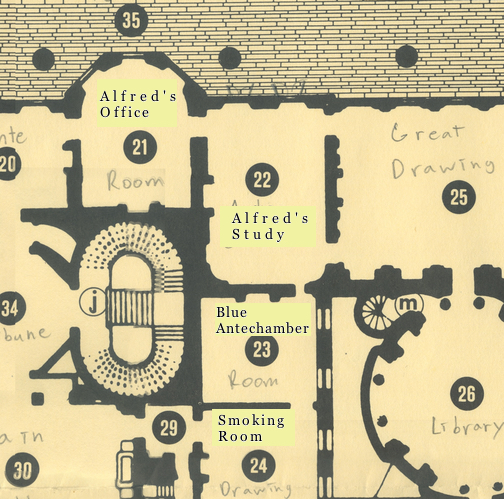 Since the overview map is a bit small, I'm providing a detail of relevant rooms in the mansion as we visit them. This isn't to mean this is the only important part of the mansion, it's just for a little guidance as we go. We enter the scene of the crime, Sipton’s study, from the Blue Antechamber. As we enter the room we examine the door between the study and the Blue Ante Chamber which was broken into by the police. It had been locked by a brass slide lock. The force the two constables applied had pulled the brass loop out by its screws. To our left we see a large fireplace in front of which is a wheelchair. On the floor in front of the wheelchair we see the all-too-familiar chalk outline of the human form which tells us the location of Sir Alfred’s penultimate resting place. On the wall across from the fireplace hangs the infamous knife collection, consisting of over fifty knives of every style and period. The empty silver and jewelled scabbard of Persian origin indicates the source of the murder weapon that ended up in Sir Alfred’s chest. It is positioned about five feet from the floor in the centre of the collection. We now turn our attention to the two French windows that open out onto the veranda. One is locked form the inside while the other has a broken pane of glass at the level of the door handle. There are bits of broken glass on the floor. There are two other doors in the study. The one that leads into the Great Drawing Room is locked from the study side. The other, leading into Sipton’s office, is unlocked and ajar. I guess this collection isn't made up of stage knives. Change/add any vote as desired. The next clue point will be decided in about 24 hours (~4 a.m. Wednesday London time). e: Forgot to mention that we visited G-22 (Alfred's study and the murder scene), not G-3, which for this case is configured as "Alfred's rooms". G-3 doesn't have a clue point, anyway, so I didn't really need to make the choice of going with the intended spot. Kangra fucked around with this message at 03:54 on Apr 28, 2020 |
|
|
|
One thing that keeps nagging at me is a mention in Sir Alfred's obituary where it says he returned after six years in the US with an entire £ 100 to start his company but no further details are given. What was he up to over there that got him that money?
|
|
|
|
I'd like to visit Sir Alfred's office (G-21) since it's unlocked and snooping around might reveal whether or not he's been up to anything suspicious followed by Scotland Yard (13SW) to talk to the two officers.
|
|
|
|
I agree we should check out the office (G-21).
|
|
|
|
Voting totals for CP 2 10 Alfred's Office (G-21) 8 Scotland Yard (13 SW) 3 Salvation Army (69 EC) 2 St. Bart's (38 EC) 1 Mrs. Sipton (U-6) I hadn't quite decided how to deal with votes that have been removed, but for now I think I'll keep vote points at their value when posted, regardless of whether other clues have dropped out or not. It's easier for bookkeeping and reduces the weight of older votes a bit. (Votes are based on 5 points for the first choice, -1 for each choice after it). Had to work a bit later so the clue point will take some time to get posted.
|
|
|
|
Case 1, Clue Point 2 G-21 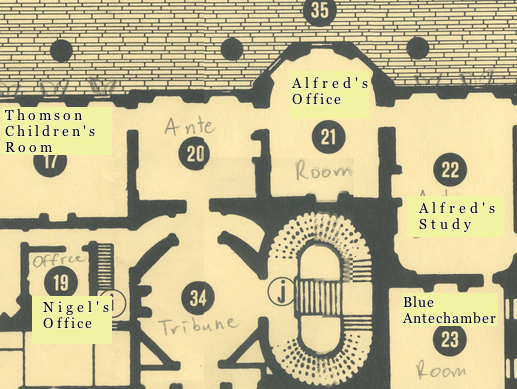 We enter Sir Alfred’s office through the door from his study. To the right is a large wooden desk that faces outward into the room. There is no chair behind it but plenty of space for his wheelchair. The wall to the left of the door is lined with file cabinets. The wall across from us is lined with books. Above the fireplace hangs a large painting of a clipper ship. As we move into the room, we see that several of the file cabinet drawers are open, and some of the files are strewn about on the floor and on top of the cabinets. The desk also looks as if it has been rifled. Wiggins moves over to the desk and begins looking through the papers and books. “A couple of things look to be of interest,” he says. “Look at his appointment book — the page for yesterday has been torn out. The only appointment down for today is for ten and the name looks like... God, this is terrible handwriting... looks like it says Morris.” Wiggins now begins a search of the desk drawers. “Here’s something interesting, a receipt from Moser’s Detective Agency, dated eight months ago. I wonder what our friend Matt found out. Doesn’t look like anything else of interest. Wait, here’s a letter addressed to Mrs. Sipton with a return address of Donald Stillwater, Dover Rooms, 11 Union Road, London.” Wiggins opens the letter and begins reading. “It’s just a short note.” Wiggins shows it to us. Dearest Cissy, Just a note to tell you that things are going well for me. I hope I will see you the next time you visit your parents. I plan to have dinner with them next Sunday. Hope I can see you then. Yours with affection, Donald “Doesn’t say much one way or the other, does it? Anything else?” “Where does that door lead to?” “To the children’s room. Is it locked?” "No." “Well, put everything back and we’ll leave.” I hadn't intended to put in another map detail, but that last bit is a little confusing if you only see the previous portion. The children's room is there, but beyond an anteroom as shown on the map. Directory look-ups (Dover Rooms) Doty, Eric.......19SE Dover Rooms......11SE Dowd, Elwood P...67WC (Morris - Moser complete, since they're close) Morningstar, Mary..........4SW Morris, William............3EC Morrissey & Cassidy........44S Mortimer House............54NW Mortimer's................95WC Mortis, Rigor..............4EC Mortlock & Sons...........86NW Moser's Detective Agency..18WC Moultre & Sons............18WC (This is another reason why I add surrounding names from the directory.) ~24 hours to change/update/add votes before the next clue point is decided.
|
|
|
|
Case 1, Clue Point 3 13 SW - Scotland Yard We find Inspector Lestrade in the small cubicle that is his office. There is only room for us to stand in front of his cluttered desk. He makes no effort to make us more comfortable. Lestrade is satisfied to make us feel like school children standing in front of the headmaster’s desk. “I can’t believe that you're interested in the Sipton murder. It’s an open and shut case. No doubt that Stillwater is the murderer. Why is Holmes wasting his time on this one?”’ “I must admit, Inspector, that Holmes doesn’t seem to have much interest in this case,” says Wiggins, “but Watson does.” ”Ah, Mrs. Sipton got to him, right?” “She seems to have made an impression on him. Come on, Inspector, tell us what you’ve got.” “Alright. Don’t want to stand in the way of Watson’s chivalry.” Lestrade settles into his role of dispenser of knowledge. “Yesterday afternoon the Home Secretary notified me that Sir Alfred Sipton had a personal family problem that might require the intervention of the police. He requested two men who were to arrive at eight last evening and report to Sir Alfred personally. I sent Jack Tucker and Peter Jones. They said that Sir Alfred had them wait in the antechamber to his study. He told them nothing other than that he would call if and when they were needed. After being kept waiting for over an hour, they heard Sir Alfred cry out. “When they heard the shout, they made straight for his study and there found Stillwater bent over the body with the murder weapon, a Persian knife that had hung on Sir Alfred’s wall, in his hand. As my men entered he tried to make a run for it out the veranda door through which he had come. The glass in the door was broken, showing how he had entered.” “Why did it take Sir Alfred so long to call for help?” “He was asleep, Wiggins. He had fallen asleep in his wheelchair.” Lestrade takes on the manner of a headmaster who has just realized that the student in front of him is not very bright. “‘Look, it’s very simple. Sir Alfred is sitting in front of the fire. He falls asleep. The fire was almost out, the room was dark. What else would he be doing in a darkened room? Use your head, Wiggins. Hasn’t Holmes taught you anything? Stillwater comes up to the veranda, goes to the study door. He finds it locked, so he breaks the glass and unlocks the door. He sees that Sir Alfred is asleep. He walks over to the knife hanging on the wall, removes it and stabs Sir Alfred. That's when Sipton screamed, bringing my men to the room. See, it’s simple.” “Why would Stillwater want to kill Sir Alfred?” “Because he was in love with Mrs. Sipton, and she may be in love with him. We haven’t ruled out Mrs. Sipton as a co-conspirator. We're still investigating that angle. I am not a romantic like Watson. Too much experience with the darker side of human nature. If only Sir Alfred would have confided in my men, he might still be alive.” “What do you mean?”’ “Well, Sir Alfred must have had some inkling that his life was threatened and that Stillwater was the one threatening it." “Do you have any proof of this?”’ “As a matter of fact we do. We found letters addressed to Mrs. Sipton from Stillwater in Sir Alfred’s desk. Very friendly letters, if you know what I mean. So Sir Alfred knew about Stillwater’s feelings for his wife. He must have confronted Stillwater with this knowledge and that was when Stillwater threatened Sir Alfred’s life. An open and shut case..” “Could we see the letters?”’ “No, you cannot. Now, if you will let me get back to my work I would appreciate it.” “But, I don’t understand...” “I am sure you don’t Wiggins, but let Holmes explain it to you. I don’t have time. Now get out.” Directory look-ups (Peter Jones) Jones, Pearl..............78WC Jones, Inspector Peter ....3WC Jordan & Co, Ltd...........48S (Jack Tucker) Tubbs, Egbert..............37NW Tucker, Jack...............82SE Tulloch, Howard............31WC Another clue point, another day to make some choices on where to go. Current vote status: 3 Salvation Army (69 EC) 2 St. Bart's (38 EC) 1 Mrs. Sipton (U-6)
|
|
|
|
Since it was apparently a "family problem," I feel like we should be looking into the Thomsons. We might get more useful info on them from servants than from the Thomsons themselves, but I don't think we know enough to know who'd be useful to ask, other than maybe the governess, as the only person in the household who was working directly for them. Going to Sipton Tea Co. might also tell us something about them, or at least Roger--although as the person who most obviously benefits from this he seems too obvious of a suspect to actually be the one who did it. We should probably also see what Alfred hired a private detective for--the obvious conclusion is to find out if his wife was having an affair, but he might've been concerned about something else. So my votes: 1. Mrs and Mr Thomson's Rooms (G-14) 2. Sipton Tea Co (39EC) 3. Moser's Detective Agency (18WC) 4. Thomson Children's Room (G-17)
|
|
|
|
Case 1, Clue Point 4 G-14 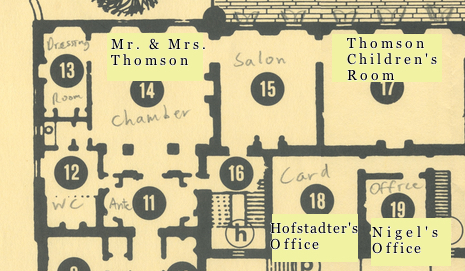 Roger Thomson stands in front of the fireplace while his wife Prudence sits in a chair to his left. We are all seated, with the exception of Wiggins who likes to maintain level eyesight with the person he is interviewing. “Cecilia asked us to talk to you, so we will, but I would appreciate it if you would be brief,” says Roger Thomson. “Yes, sir. What can you tell us about last night’s events?” “Nothing I am sure you don’t already know. Last evening I was at my club, the Bagatelle, playing cards as I do every Friday. I arrived home at around ten to discover that my uncle had been murdered. I only know the details from talking to the police, and I am sure you have done that.” “Yes. Mrs. Thomson, could you please tell us what you know?” “Really, Roger, I don’t see why we have to be put through this. It was—" “Prudence, just answer the man’s questions so we can get this over with.” “I have told all of this to the police. Just because Cecilia—" “Prudence! Please!” “What do you want to know?” “Do you have any idea who might have murdered Sir Alfred?” “Yes, Donald Stillwater! The police found him standing over the body with a knife in his hand. My God, Roger, just because that little—" “Prudence! Just answer his questions.” “Did you see or hear anything out of the ordinary last night?” asks Wiggins. "Yes!" “What?” “Uncle Alfred was murdered. That is out of the ordinary.” “Yes, of course, but you saw or heard nothing out of the ordinary before the murder?”’ “No.” “Where were you at the time of the murder?” “Roger, this is too much! I will not stand for it!” Mrs. Thomson rises out of her chair and turns her full attention to Wiggins. Her husband sighs with resignation and makes no effort to interrupt or stop his wife. “I will tell you this once, and then I am leaving. I was in my room when Uncle Alfred was murdered. I heard nothing and I saw nothing. You tell Cecilia to face the fact that it was her friend that killed her husband and that everybody knows why. I consider it insulting that she brings in outsiders to poke into our lives. If you want to find out the reason Alfred was murdered, then you look to her. I think she was in on it, that Alfred knew and—" “Prudence!” “Shut up, Roger! Alfred knew about her and her churchmouse boy friend. I don’t mean boy friend, I mean lover. Alfred’s body may have been failing, but not his mind. Mark my word, he knew and was going to cut her out of his will, sending her back to the East End where she belongs. She’s a tart and no matter how much money she has, she always will be. My husband works day and night in the business, and he hasn’t done it to put money into that tart’s pocket so she and her lover can live on his labour. Now that Alfred is dead I see no reason to stay under the same... Oh, get out of here and leave us alone!” With this she storms out of the room, slamming the door behind her. Her husband reaches into his pocket and removes a cigarette case from which he removes a cigarette which he lights. “I am sorry that my wife blew up, but I must say that I agree with her about the fact that we have told all we know, and I see no reason to say it again. I think my wife needs me now. So if you will excuse me.” With that statement Mr. Thomson also exits the room, but without slamming the door. Directory look-ups (Bagatelle) Baedecker's Excursions...........54WC Bagatelle Card Club..............14NW Bagby, Riff......................65SE As we're heading into the weekend, I'll allow ~48 hours before the next decision. Next clue will post around 2 a.m. Sunday morning, London time. 4 Sipton Tea Co (39EC) 3 Moser's Detective Agency (18WC) 3 Salvation Army (69 EC) 2 St. Bart's (38 EC) 2 Thomson Children's Room (G-17) 1 Mrs. Sipton (U-6) Kangra fucked around with this message at 04:37 on May 1, 2020 |
|
|
|
I'll toss in a vote for 14NW to check out his alibi, but I really hope someone else votes, because I don't want to be solely responsible for how badly we do at this case.
|
|
|
|
Well, it's worth noting that the 8 months old receipt for the detectives lines up with when our victim suddenly became friendly with Stillwater again. That's interesting - perhaps what they found out (or didn't find) lead to the reconciliation? It seems Mrs. Thomson might have motive for the murder, judging by her reaction.
|
|
|
|
I still believe that we can gather some new information at the Salvation Army 69 EC, maybe someone could shed some light on Donald and Alfred's working relationship. It would be useful to get a detailed account from the two detectives at Scotland Yard 13 SW too.
|
|
|
|
Vote is tied. Will it be the card club or the teetotalers?quote:There were 2 items in your list. Here they are in random order: Rocket Baby Dolls posted:It would be useful to get a detailed account from the two detectives at Scotland Yard 13 SW too. We did go to Scotland Yard (13 SW) as clue point 3, but only got to talk to Lestrade. We got the men's names, but I don't want to mark this as a vote for trying them at their houses without you saying so. I should probably also keep a list of where we've visited on the vote list. Just as a note to clarify on votes: New votes will be placed at the top of the ranking, and that also goes for votes previously on the list (as happened here with the Salvation Army). Old votes will move down and be eliminated if they drop below fifth place, or can be canceled explicitly if desired.
|
|
|
|
Case 1, Clue Point 5 69 EC The Salvation Army Major Barbara greets us in a very brisk military manner. She is a stout woman in her mid-forties, sharply dressed in her Salvation Army uniform with its sparkling brass buttons which dazzle the eyes. “Sit, sit,” orders the Major as she points to the chairs in front of her desk. “You’re here about Captain Donald. Yes, yes, a tragedy, a true tragedy. Captain Donald was up for promotion, but now...” “Is there anything you can tell us about Donald?” “I was the one who brought Donald into the Army. I remember the first day that Donald came to the mission, his bright young face looking for salvation, and I showed him the way. Oh, I had such hopes for him. God needs good strong soldiers to fight his battles. This is a Godless age we live in and Beelzelbub is strong. Oh, so strong.” “Major, could you just—" “I am sorry, but with Donald arrested Lucifer has won another battle. But it’s not the war.” “So you think Donald is—" “Innocent! As innocent as the lamb. Oh, I know that the Spirit of Evil tried to drive a wedge between two strong warriors of God, but it was a battle Satan lost. Sir Alfred told me that he had misjudged Donald and hoped that God would forgive him. I told him that Donald did and so would God.” “Do you have any idea who was responsible for Sir Alfred’s murder?” “Yes!” “Who?” “Satan! He is behind all that is Evil, all that is Godless.” “Yes, of course, Major. We know only too well the power of evil, but we are more interested in the human agents, the front-line troops.” “May God guide you in your work.” “Amen, Major, amen,” sighs Wiggins as we march out of Major Barbara’s office. Looks like we got our murderer, folks, now we just need a motive. So why would Satan want a tea merchant dead? Already visited: Sir Alfred's Study (G-22) Sir Alfred's Office (G-21) Scotland Yard (13 SW) Mrs and Mr Thomson's Rooms (G-14) Current votes: 5 Bagatelle Card Club (14 NW) 4 Sipton Tea Co (39EC) 3 Moser's Detective Agency (18WC) 2 St. Bart's (38 EC) 2 Thomson Children's Room (G-17) 1 Mrs. Sipton (U-6) Next clue point will be decided in ~24 hours. Kangra fucked around with this message at 19:36 on May 3, 2020 |
|
|
|
I feel like Moser's would hopefully let us crack the case of the reconciliation, but I'm not sure how that would lead to the real killer. I wonder if it'll turn out Donald is Alfred's son - we know his mother died, but there was no mention of a father. And then someone (I think Mrs. Thomson, since her husband's alibi would be far too easy to disprove for him to be lying) killed Alfred to bury the truth so the will couldn't be changed. Perhaps we could stop by the Children's room, since that may have been how the killer at least got into the office, see if the governess knows anything. I'm not sure why the victim wanted the police there - perhaps because he found his office/study had been gone through? So my vote is first off the children's room G-17, and second Moser's Detective Agency 18WC. I figure Morris might be a red herring and it's actually Mortis - although I'm not sure what that business is - a funeral home, maybe? An estate lawyer?
|
|
|
|
Case 1, Clue Point 6 G-17  Rooms adjoining the other side of this room can be seen in Clue Point 4. We find Miss Dell-Olio in the nursery with the two Thomson boys, Alfred and Roger. Miss Dell-Olio is seated in front of the French windows with a book resting on her lap, The Ring and the Book by Robert Browning. Her eyes are not fixed on the book or the children, but the ceiling. As we enter, she takes no notice of us, nor do the children, who are busy at play with their blocks, one stacking them up, while the other knocks them down. They both seem happy with this arrangement. “Miss Dell-Olio, could we have a word with you?” Wiggins’ question causes Miss Dell-Olio to sit up with a startled look on her face; the children still take no notice of us. “Oh, I am sorry, I didn’t hear you come in. May I help you?” “Mrs. Sipton has asked us to look into the death of her husband. May we ask you a few questions?” Alfred now looks up for the first time and gives us his full attention. His brother takes this opportunity to build their construction higher now that Alfred has stopped his destruction. “Yes, of course.” “Did you see or hear anything last evening that might throw some light on the night’s events?” “No, not that I can think of. I put the children to bed at eight-thirty and then went to my room. I was in bed reading when I heard all the commotion. I went downstairs and was told what happened. I then went and checked on the children to make sure they were alright. Alfred was still awake and wanted to know what happened. His mother came in and told him, and we stayed with them until he fell asleep.” Alfred has now walked over to Miss Dell-Olio and climbs onto her lap. “Did you know Great Uncle?” asks Alfred. “No, we didn’t.” “He went on a trip. A trip to heaven because he was old.” “Now, Alfred, go play with your brother.” Miss Dell-Olio lifts Alfred off her lap. He now goes to Wiggins. “Are you old?” asks Alfred of Wiggins. “Not too old. Did you hear or see anything last night?” “I heard God call Great Uncle.” “Alfred, don’t say things like that,” says Miss Dell-Olio. “It’s true, papa told me so.” “When?” “This morning.” “What did you hear?” “Last night I heard someone shout. It scared me; then papa came in and gave me a kiss and told me to go to sleep. Said that I was dreaming. I told him you can’t dream when you're awake. After papa left, nanny came in and said you can dream when you're awake, and those are nice dreams, but I didn’t think it was nice. This morning when I went to watch papa shave, he said maybe I heard God call Great Uncle.” “Children have such imaginations. Now go play, Alfred.” “Did you see Mr. Thomson last night?” asks Wiggins. “No, he was out last night. Oh, he did look in on the children around ten-thirty and asked if they were alright; they were asleep. I stayed in their room the rest of the night in case they woke up.” Alfred is now back with his brother who has created a three foot structure out of their blocks. Alfred knocks it down on top of Roger, causing Roger to burst into tears. Miss Dell-Olio jumps up and runs to Roger’s aid as we bid farewell. We're getting pretty interesting things from all these clue points so far. 24 hours for the next point. Already visited: Sir Alfred's Study (G-22) Sir Alfred's Office (G-21) Scotland Yard (13 SW) Mrs and Mr Thomson's Rooms (G-14) Salvation Army (69 EC) Current votes: 7 Moser's Detective Agency (18 WC) 5 Bagatelle Card Club (14 NW) 4 Sipton Tea Co (39EC) 2 St. Bart's (38 EC) 1 Mrs. Sipton (U-6)
|
|
|
|
OK, so this is definitely interesting.
|
|
|
|
Can I vote for the card club again, or does that not count if I voted for it already? It seems like there's some contradictory information in that last clue point about whether or not Mr Thomson was home last night.
|
|
|
|
Bagatelle is already your #1 vote, so re-voting wouldn't give it any more points than it has. Your last post would have put it as your first choice if it hadn't been (e.g. if you said you wanted to vote for Sipton Tea right now, it would be your #1 and move Bagatelle to your #2). I think to make it clearer, if there is a vote that changes someone's earlier ranked order, I'll mention it in the vote totals. Votes remain at the rank as they were originally posted otherwise. You're not locked in, of course, as you can always re-order your choices if you want, or explicitly state that you are cancelling previous votes. As another example: if votes stay as they are, you can affect the current choice by withdrawing your vote for Moser's, since right now it's 3 points from you, 4 points from Yvonmukluk.
|
|
|
|
Case 1, Clue Point 7 18 WC Moser's Detective Agency Moser settles his large frame into his chair and reaches for one of the long black cigars in the box on his desk. “What do you want to know, Wiggins?" asks Moser as he clips the end of his cigar. “I understand that you did some work for Sir Alfred Sipton. Could you tell us anything about it, Matt?” Moser rolls his cigar from hand to hand as he looks us over in a thoughtful manner. He seems to have come to some conclusion for he pops the cigar into his mouth and lights it. After sending a heavy blue cloud of smoke our way he says, “I'll tell you what, Wiggins. If you agree to dig up some information for me, I'll tell you what you want to know.” “What is it you want me to find out?” “There are a couple of things I'm working on that I may need some help on. Having the opportunity to employ Holmes’s famous force is something I'll have to give some thought to. Now, you don’t know what information I may have. It may be something you need or it may not. But I have been of help to you in the past, so how about you taking a chance on me?” “Alright, we agree. We will help you on whatever you request. Now what can you tell us about Sir Alfred?” “Not much,” grins Moser. “I went over Sipton’s file this morning when I read about his death in the newspaper, just in case I was asked about my work for him. Eight months ago Sipton hired me to follow his wife and to report on her movements, with special attention to Donald Stillwater.” With this announcement, delivered in Moser’s best dramatic voice, he leans back in his chair and sends another cloud of blue smoke towards us. After the appropriate interval for the pregnant pause, he continues, “After two months of efficient and brilliant surveillance, I reported my findings to Sipton.” Another cloud of blue smoke comes our way. “Well! What did you report?” demands Wiggins. “That I could find no incriminating actions on the part of Mrs. Sipton. She spend her time away from home either at the Salvation Army office or visiting her parents, Mr. and Mrs. Michael Harbuck. It’s true that she did see Stillwater from time to time, but at no time did her actions show anything but friendship.” “That’s it?” asks Wiggins. “Ah, Wiggins, you always look for the worst in people and so did Sipton. He insisted that there was something between his wife and Stillwater. I explained to him that I didn’t work that way, I only reported what I saw not what he wanted me to see. That was the end of my employment.” “That’s it?” “That’s it, but remember, you owe me one.” “You're right, Matt, we owe you one.” We'll actually get to see Moser in a later case, so it's kind of a good thing we visited him now. Directory Look-ups (Harbuck) Harbinger, Randolph......78SE Harbuck & Stram...........27S Harbuck, M...............55SE Harcourt, Maurice........52SE Things are narrowing down, it seems. Another 24 hours to the next point. Already visited: Sir Alfred's Study (G-22) Sir Alfred's Office (G-21) Scotland Yard (13 SW) Mrs and Mr Thomson's Rooms (G-14) Salvation Army (69 EC) Thomson Children's Room (G-17) Current votes: 5 Bagatelle Card Club (14 NW) 4 Sipton Tea Co (39EC) 2 St. Bart's (38 EC) 1 Mrs. Sipton (U-6) Kangra fucked around with this message at 11:46 on May 5, 2020 |
|
|
|
Case 1, Clue Point 8 14 NW Bagatelle Card Club We are allowed into the bar of the Bagatelle Card Club after telling the doorman that we are interested in membership. The luxuriously appointed setting of the bar makes the ordering of anything other than brandy inappropriate. After our snifters have been placed before us, Wiggins engages the barman in conversation. “Very nice club,” states Wiggins. “One of the best in London. Thinking of becoming members?” "Yes." “Mr. Chapman, the club’s manager, is out at the moment. If you have any questions, I will be glad to answer them. My name is Edward.” “Thank you, Edward.” “Do you know any of the members? You will need a member as a sponsor.” “We know Roger Thomson.” “One of our more illustrious members. I am sure that with Mr. Thomson as a sponsor, you will have no trouble being accepted.” “We were to meet him here last night, but we were held up. Did he make it?” “Oh, yes. Every Friday and Saturday without fail.” “We were going to drop by around nine last evening and have a drink with Roger. Guess we should have.” “Good thing you didn’t. He left early, a little before nine. He didn’t play last night, just sat at the bar. I wondered why — maybe he was waiting for you.” “Edward!” calls a man at the other end of the bar. “Be right with you, Colonel Moran. Well, I have to get back to work. Nice talking to you.” We drain our snifters and leave. Okay, maybe let's not put in our application if that guy's going to stick around. Although I'm 80% sure that conversation about membership was sarcastic on both sides. Already visited: Sir Alfred's Study (G-22) Sir Alfred's Office (G-21) Scotland Yard (13 SW) Mrs and Mr Thomson's Rooms (G-14) Salvation Army (69 EC) Thomson Children's Room (G-17) Moser's Detective Agency (18 WC) Current votes: 4 Sipton Tea Co (39EC) 2 St. Bart's (38 EC) 1 Mrs. Sipton (U-6) Get your votes in if you want them. Remember that to close the case we probably want to know who the murderer is and their motive. Kangra fucked around with this message at 06:03 on May 7, 2020 |
|
|
|
I think the culprit is almost certainly Roger Thomson--between his son's testimony and the confirmation that he left the club early, I don't think his alibi holds up--but there doesn't seem to be anything pointing us very strongly in a direction in which we might find the motive, so the tea company is still my best guess.
|
|
|
|
Ghost Car posted:I think the culprit is almost certainly Roger Thomson--between his son's testimony and the confirmation that he left the club early, I don't think his alibi holds up--but there doesn't seem to be anything pointing us very strongly in a direction in which we might find the motive, so the tea company is still my best guess. I think that Donald's going to turn out to be Alfred's illegitimate son (mention of a dead mother but no father, the fact Cecilia notes Sir Alfred was old enough to be her father, the sudden shift in attitude - although I'm not sure how Alfred would have learnt this - Moser would have surely mentioned it if he was the one to discover it). But I'm not sure how to prove it. Didn't they mention one of the maids was from the Salvation Army? Maybe she knew Donald.
|
|
|
|
Yvonmukluk posted:I think that Donald's going to turn out to be Alfred's illegitimate son (mention of a dead mother but no father, the fact Cecilia notes Sir Alfred was old enough to be her father, the sudden shift in attitude - although I'm not sure how Alfred would have learnt this - Moser would have surely mentioned it if he was the one to discover it). But I'm not sure how to prove it. Looking back over the post with all the introductions, that's Cynthia the scullery maid, and we don't know where she is and would have to ask the cook. Not sure if the extra clue point needed is worth it or not, but maybe the fact that she's the only member of the household who's not easy to find is a tip-off that she's potentially important?
|
|
|
|
Case 1, Clue Point 9 39 EC Sipton Tea Company The reception area of the head offices of the Sipton Tea Company is hung with black crepe, and we find ourselves talking to one of the few office workers present in little more than a whisper. “Could you tell me who's in charge here?”” asks Wiggins in a quiet, pious manner. “Why are you whispering? Speak up. What do you want?” replies the clerk whose strong voice takes us by surprise. “We have been asked by Mrs. Sipton to look into the death of Sir Alfred. We weren’t sure the office would be open.” “Blimey, are you kidding! The old man would turn over in his coffin if the great Sipton empire stopped for one hour.” “Are you in charge today?” “No, I'm just one of the wage slaves. The boss, Thomson, won't be in today, and the head clerk is at the Strand store.” “What was the reaction of the employees to Sipton’s murder?” “Sipton was no friend to his employees—he paid low wages, demanded long hours and when they read his will, we, the employees, won’t be remembered. So, to answer your question, no tears were shed. I assume it will have no effect on us since Thomson will continue to run the company.” “Any rumours about who might have committed the murder?” “No, I'm sure it had nothing to do with the company. Thomson is now head of the firm, so if anyone wanted to knock off the head of Sipton Tea, it would have been Thomson who would have been the target.” “Thanks for your time.” “Right-o. Oh, do you know Hofstadter?” “Sipton’s secretary?” “Right. If you see him, ask him what I'm to do with these papers Sipton wanted. It took me forever to find them; they were misfiled.” “What do they pertain to?” “You said you were working for Mrs. Sipton?” “Yes." “Then I guess there’s no harm in telling you. They deal with the Sipton holdings in Ceylon. It’s very strange. Over forty percent of the tea was sold to American buyers, but there is no record of payment. This has been going on for almost two years. If you see Hofstadter, ask him what I should do. I tried to ring the mansion, but the line’s been busy all day. drat telephones.” “Send a telegram.” “Good idea, thanks.” Already visited: Sir Alfred's Study (G-22) Sir Alfred's Office (G-21) Scotland Yard (13 SW) Mrs and Mr Thomson's Rooms (G-14) Salvation Army (69 EC) Thomson Children's Room (G-17) Moser's Detective Agency (18 WC) Bagatelle Card Club (14 NW) Current votes: 2 St. Bart's (38 EC) 1 Mrs. Sipton (U-6) Add more votes, or if you think it's time, put in votes to close the case. I might not get a post in tomorrow, so next vote will be tallied late Saturday night (London time).
|
|
|
|
Well then. I think we have our motive - it seems Thomson was up to shady dealings of some sort and Sipton found out (hence calling the police). Thomson killed him to cover up the secret. I suppose we could go to the Strand to try and find the head clerk (although considering we don't even know his name that'd be a needle in a haystack), or go talk to Hofstader. I'm still not sure what the significance of 'Morris' is, though. Could it be a red herring? We could try and close the case, but I feel we might need to know more of what Thomson was actually doing before we get to that point. Yvonmukluk fucked around with this message at 07:40 on May 8, 2020 |
|
|
|
OK, this is going to drive me nuts if I don't know, let's heck out William Morris 3EC. If he's not the Morris referred to in the note, then it's either Rigor Mortis (in which case it's poor handwriting) or Morrissey & Cassidy, (in which case Morris is presumably an abbreviation) which presumably are lawyers, which'd make sense if the old man was planning to rewrite his will (if my theory about Donald actually being his son) or was worried about criminality at his business. These other two aren't votes right now, just spitballing. More directly related to the case, Hofstadter (G-18) is someone to follow up on, since he can probably shed more light on the workings of the business.
|
|
|
|
Checking the address for William Morris, we get... nothing at 3 EC So we'll be going to the next clue point voted for, Hofstadter (and you might be happy enough with those results with respect to Morris). Incidentally, since The Strand is a street (and not yet a publication even in a Watsonian world), if you really want to check that Sipton store you'd probably need to refer to the map and go by address. The previous directory listings were the only ones for Sipton Tea.
|
|
|
|

|
| # ? Apr 19, 2024 01:15 |
|
Case 1, Clue Point 10 G-18 Rufus Hofstadter's Office  “I am, was, Sir Alfred’s private secretary and had been for over twenty years. He was a hard man, but he was fair, and he understood and rewarded my dedication to Sipton Tea & Spice. Even when I knew that Sir Alfred was dying I could not believe that there would not be a Sipton to serve. Mr. Thomson is a good man, but is not a Sipton.” “Do you know why anyone would want to kill Sir Alfred?”’ “Ha, ha, ha. I am sorry, but as I said, I was with Sir Alfred for more than twenty years. In fifteen years he took a single grocery store with a hundred pounds capital and created an empire. You don’t do that without creating a great deal of enmity. But he was a sick old man. I don’t know why anyone would kill a dying man.” “Is there anything you can tell us that might shed light on this affair?” “I don’t know what. My duties have been rather light since Mr. Thomson has taken over the running of the firm, or rather, since Sir Alfred finally loosened his reins on the company. During the past few months, as Sir Alfred’s health has grown steadily worse, my tasks have consisted primarily of writing his letters and assisting him in putting his affairs in order. I am one of the few people who can read his writing since his stroke, so he depends on me a great deal. “Sir Alfred was never satisfied; you think every thing was taken care of, then all of a sudden he was back working on it. Mr. Thomson, from my position, has been doing a very good job running the firm, and Sir Alfred thought so too, but the more his health deteriorated , the more concerned he would become. Instead of trying to enjoy the little time left to him, he would just work harder. It was like he wanted to leave everything in perfect shape, and of course you can’t. But his whole life revolved around work — work in his business, work in his charities. Yesterday was a perfect example.” “What do you mean?” “Well, he’d been going over the company books this past week, checking my work, checking everybody’s work. Wanted me to go down to the office and get some papers and invoices. I have no idea why. Something upset him.” “What?” “I have no idea. He never told me why I was to do things, only what to do. He had me make an appointment with his solicitor, William Morris, for this morning.” “And you don’t know why?” “No, I don’t, although Morris was to bring Sir Alfred’s will with him.” “Do you know why the police were called?” “No, that was a complete surprise to me.” “Where were you last evening?” “I was having dinner with friends at the Carleton. I got back to the mansion at a little before eleven. My first night out in weeks.” “Was Sir Alfred in the habit of working late in his study?” “Every night, six days a week. Sunday he spent visiting the various charitable enterprises in which he had an interest. All in all, he was a good man. This was not the ending his life deserved.” The trouble with having Hofstadter as your secretary is that everything he does seems to take so much extra time. Directory Look-ups (Carleton) Carina..............73WC Carleton, The........7SW Carleton, Lloyd.....42SW Carley, Chester......8SE Yes, this is the Carleton, the real-life site of the mansion this is based on, just in case it wasn't confusing enough. Already visited: Sir Alfred's Study (G-22) Sir Alfred's Office (G-21) Scotland Yard (13 SW) Mrs and Mr Thomson's Rooms (G-14) Salvation Army (69 EC) Thomson Children's Room (G-17) Moser's Detective Agency (18 WC) Bagatelle Card Club (14 NW) Sipton Tea Co (39EC) Current votes: 2 St. Bart's (38 EC) 1 Mrs. Sipton (U-6) Further votes? ~24 hours until the next decision point. Kangra fucked around with this message at 03:30 on May 10, 2020 |
|
|





